#I hope you all enjoyed this analysis
Text
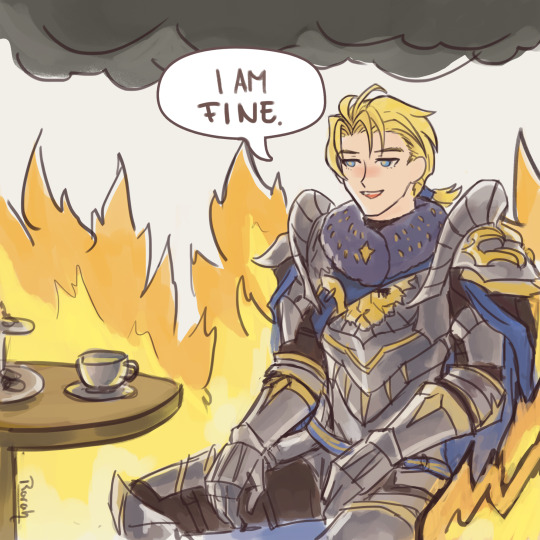
The mentally stable Dimitri Fire emblem 3 hopes.
It surprises me that there's still ppl claiming so, but then I remember we're talking about 3h interpretations and I have to make peace with it.
But that doesn't stop me from venting a little bit in this little space I have lol. Actually, it dries me and makes me feel bad to bring this up because I will have to talk bad about Dedue, and I don't want to talk Bad about Dedue. He's a genuinely good boy. But "Human" nonetheless, which means Flaws.
I like Felix too but he's become some sort of a clown that doesn't make me feel too bad. I like Felix tho, In a different way.
Mostly talking about these two because the take that "Dimitri has better support system" baffles me because, technically, these two are his support system in HopesVerse. The persons who Dimitri relays on and seek solace/advice/support. The rest doesn't really tackle any of his personal struggles (aside from the Mage!Mitri frustrated dream, but that's out of the bad equation in our 'mentally unwell' set of pixels, and Shez only has a glimpse). Contrary, to Houses verse where the whole blue lions cast knew about his shit, didn't know what to do, but didn't leave either.
I tackled this topic with other person on Twitter who was (or still is) on board with this take and the phrase they used was They contained him better, which of course I agree and remarked that was exactly the problem.
Contain him is gonna be contra productive. I used a water dam analogy, where the structure of such dam is damaged, and the pressure of water keeps accumulating. Causing a foreseeable damage for the dam itself and the surroundings. You don't need to be a genius to understand it, you need experience or knowledge for mental ill topics tho.
I really don't want to extend so much on here because it's mostly just, rant format more than a proper analysis so I just want to point out these two things in their support conversations.
First, Dedue.
Encourage him to keep on the vengeful path. Which we know was the final goal of Azure Moon and if you payed attention to 3 houses message. The whole Vengeful argument was something Bad, to keep it simple.
Despite Dimitri actively looking for answers/guidance for something that, in a rational state he can see clearly like vengeance will consume his life (also Shez and Felix called out this behavior). Dedue answer only encourage him to keep on that path, because he would do that 💔. Presenting 2 oposite views is a great formula for confusion and disorientation.
Now, Dedue's role is primary SUPPORT, not guidance nor orientation. He will support his shit no matter what, and we are quite aware of that if played Houses.
Second, Felix.
Felix is a special case. He is smart but also an idiot lacks A LOT of soft skills to actually be of help.
He's the only one who knows in this verse about Dimitri having a mental issue. In their A support to say the least, so they don't close or solve anything. What makes it more worrisome is the fact that Felix conceals the issue as a secret.
"So try to keep that whole "removing their heads" thing in check, yeah? We can just call it our little secret."
this extract here makes me feel so unwell 😭help
The whole burden falls over him and his lack of skills and wisdom on the matter will be too much for him later on. He at least, will be able to recognize that the problem is beyond of his capabilities and will look for help. Felix himself has his own issues and journey where he needs to learn. He's forced to get pass beyond some of his angry teen behavior but hasn't completely get over it.
There is a lot more to tackle, but that requires more work and time.
What are the topics some of you think is important to cover around understanding the Hopes verse resolution?
Dimitri's route? something?
Do you think the route without Byleth is better?
With that being said, I would like to delve deeper into character analysis, and the role each played for the Lords too. That also requires to talk about the Byleth and needs a whole analysis on their own, which requires time (which i don't have much lol)
To end this vent, I would like to encourage people to do a little research for the terminology they're using like "Support System". Who makes it up and how it operates successfully.
The fact that ppl saying "he has better support system" only because he didn't go feral on the run alone is not entirely valid. A reminder that people can feel alone with or without people around them. And containing the issue within doesn't solve any problem. At best, it's presented later. At worse, it gets worse.
#dimitri alexandre blaiddyd#my lil blorbo with mental health issues#few3hopes#fire emblem warriors 3 hopes#Today I woke up and felt like venting#BUT Just to make myself clear#this has nothing to do with ships#you can ship whatever you want#You do you#Just in case someone has that feeling#This is an analysis from a mental health point of view#because it is one of the strong points of this character and with which many of us connect/relate#So I like to apply psychological and neurological (even psychiatric if necessary) perspectives#And I like to apply realistic theories to this fictional world because that is the good thing about three-dimensional characters#They feel so human that all these hypotheses can be applied#If some of you don't. That's cool too. You do you#Enjoy the game as you please lil fella#ALSO ALSO I'm taking into account what the intention of the developers was#(that would be tricky considering the inconsistency withing the developers' team >___>)
198 notes
·
View notes
Text
Lucienne/Lucien - How the Librarian Became the Chief.
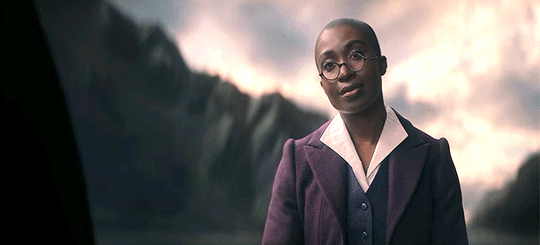
In The Sandman Netflix adaptation Lucienne is a stand out character and second only to Morpheus in importance, screen time, and centrality to the story. Lucienne is Morpheus's loyal Librarian, second in command, ruler of the Dreaming in his absence, and often times a voice of reason and advice for our dutiful King of Dreams. She is so well respected in her position that the other castle residents consider her their boss and would rather go to her for guidance and command than Morpheus himself. She takes care of Dream's ravens and even appears to have the power to create new ravens from newly deceased mortals like she did with Matthew. She is clearly extremely close to Morpheus, and is one of very few people he seems to actually listen to and trust. Lucienne's role in this story can not be underestimated.
So it may come as a surprise to any fans of the show who haven't read the comics to learn that Lucien (as he is called in the comics) is afforded very few of the above traits. In fact Lucien is no where near as close to Morpheus even by the very end of the story, as Lucienne is at the beginning. It is this difference that has fascinated me since I first started diving into the comics after falling in love with the show, and its something I view as extremely important when considering how the story is being adapted into a kinder, more sympathetic universe surrounding our central protagonist.
Lucienne's role is expanded greatly from her comic counterpart, and her relationship with Morpheus is shown to be much deeper. This is evident practically right away at the end of episode one when Lucienne comes to greet Morpheus upon his return to the Dreaming following his escape.
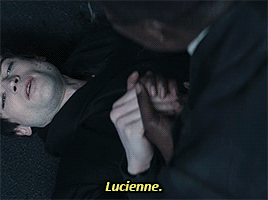
The way she runs over to him as soon as she realises he is back, and lovingly takes his hand and is so pleased to see him is a far cry from the comic where the first thing Lucien does is bow.
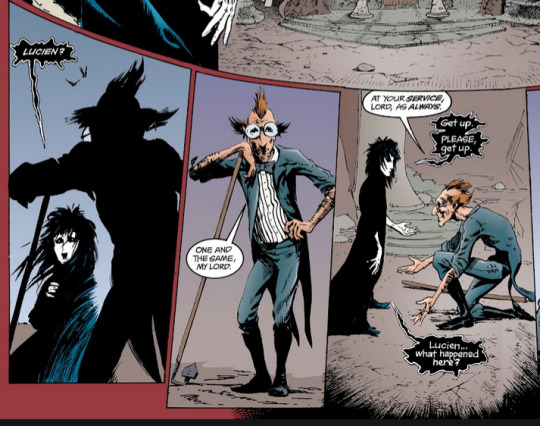
So right at the start we see a very different form of relationship here. Where Lucienne is already displaying a level of care and devotion beyond the expectations of a servant, Lucien however, is exactly that.
The servant thing has caused a bit of contention among fandom in the past. I think the confusion could come from whether or not you see Lucien or Lucienne first. Lucien IS a servant of Dream. Lucienne is more like a vice president and royal advisor. Those are two very different things after all and that difference only becomes more obvious the further you go into the story.
Lucienne accompanies Morpheus throughout his return to his crumbling kingdom, helps him as he attempt to repair the damage, follows him to Cain and Abel, and watches over his meeting with the Fates. She is by his side from the moment he returns until the moment he leaves again for the waking world to begin his quest to recover his tools, and she is responsible for Matthew's reincarnation as the new Raven and instructs Matthew to stay with him because of her concern for Morpheus's wellbeing on his quest.
I cannot stress enough how much none of this is in the comics. Lucienne shows a level of care towards Morpheus that just isn't present in Lucien in the comics. After the first meeting with Lucien at the gates of the Dreaming, Lucien doesn't appear again until he is instructed by Morpheus to conduct the census of the Dreaming. He only appears again in the Doll's House very briefly and has no involvement in Morpheus's decisions during that arc, which takes place very rarely in the Dreaming.
That's not to say that Lucien isn't a very trusted servant of Morpheus. He is the closest to Morpheus of all the residents of the Dreaming except only Matthew. But I think a lot of what we see in the show of Morpheus and Lucienne's dynamic is inspired by much later in the comics. I also think that it speaks loudly to the change in Morpheus as a character. Show!Morpheus has people almost right away who care about him and want to help him, whereas comic!Morpheus is extremely isolated. It is clear in the early comic stories that comic!Morpheus keeps himself at arms length from basically everyone. He does not have a bond with Lucien, he did not have Jessamy, and at that early stage, he didn't even have Matthew. All of this of course was primarily to make show!Morpheus a more sympathetic and likeable character - you gotta give your protagonist people who care about them, it helps raise the stakes after all.
Taking Charge - Lucienne is the real boss
One of my favourite parts of the Dolls House episodes in the Netflix show is the conflict between Morpheus and Lucienne due to the other residence and Dreaming servants going to her for advice and instruction first rather than Morpheus. Bearing in mind this only takes place less than a year after Morpheus's return from imprisonment, it speaks volumes as to how Lucienne has taken the role of leader of the Dreaming in her stride.
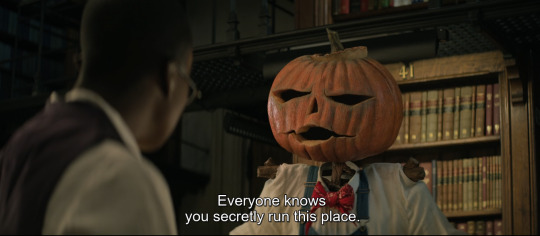
But it also indicates how Morpheus' change in the show is coming at lightening fast speed compared to the comic. In the comic, Mervyn doesn't make these observations until the Brief Lives arc, and this is indicated at that point to be a very new thing - triggered by several years post fish bowl of having to face his past decisions and mistakes (and a string of scorned ex lovers one after the other ending in a horribly matched rebound relationship with a murderous witch that subsequently rejected him and triggered him literally seeking out destruction). Lucien was only put in charge of the Dreaming when Morpheus left to go on his trip with Delirium. It is during that trip that Morpheus realises how competent Lucien is and capable of running things without problem in his absence.
Mervyn's insights are made clear here:
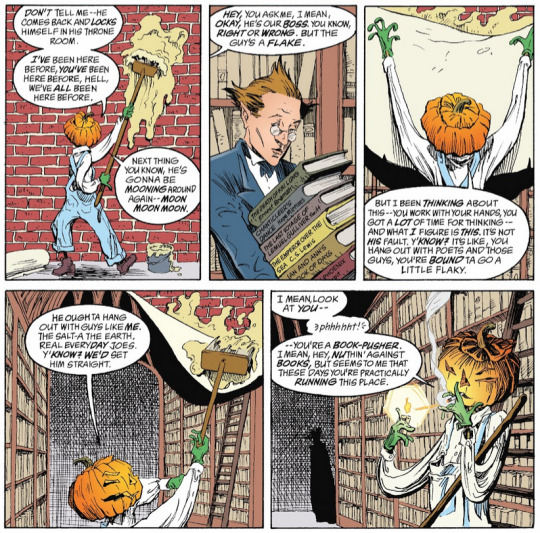
This is the only time in the comic that anyone dares mention that someone other than Morpheus might be the boss - and it is in no way as directly spelled out as it is in the show. "You're practically running the place" and "you secretly run this place" are quite different statements. The first only makes an observation about Morpheus's current lack of interest (in Brief Lives) in actually running his realm. It implies that Lucien is doing Morpheus' job for him, but does not go as far as to outright call Lucien the boss. Whereas in the show, that's exactly what Mervyn does.
In the comic, Morpheus overhears Mervyn's speech and immediately points out his reasoning for leaving Lucien in charge, for promoting him and giving him more authority.
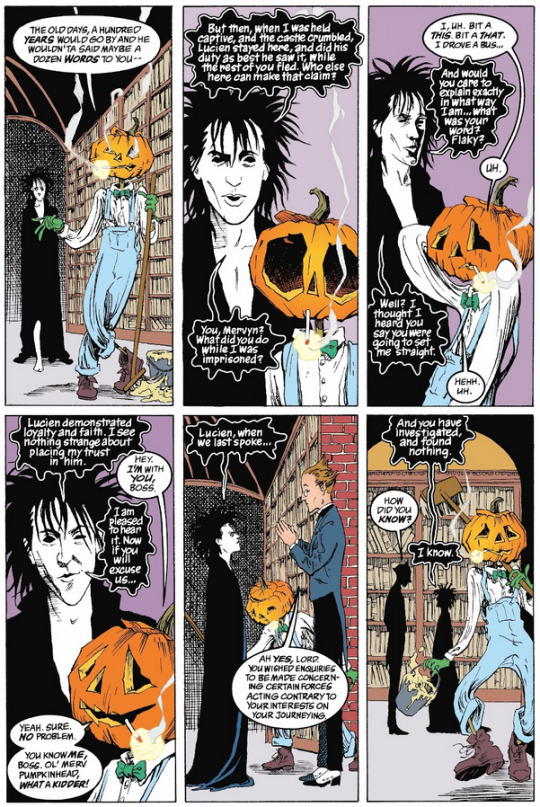
Because no one ever technically undermines Morpheus in the comic, there is no conflict here. Morpheus trusts Lucien as his loyal servant and gives him the power to rule in his stead (but only when he is absent) and there is no "secretly report to Lucien first" attitude among Matthew and Mervyn. We can perhaps interpret that this might be happening behind the scenes by this point in Brief Lives, or even just before the BL arc when Morpheus was distracted by his rebound murderess, but it is never actually directly stated that this is going on.
The tension between Morpheus and Lucienne in the show is born out of the conflict over Lucienne's position and Morpheus feeling undermined by his subjects, and its storytelling gold. But the only reason such a story works in the show is because Lucienne is so important to Morpheus in the show, because their relationship goes so much deeper than the relationship in the comic. Lucienne is not a servant, she's his god damn vice president and she knows it, and he knows it too. Throughout episodes 7 and 8 specifically he reaches out to her for her opinion and advice on the Vortex situation. He talks things through with her and seeks out her guidance. It is clear that he relies on her and it is only at the end of episode 8 when Lucienne disagrees with his punishment of Gault, that in his anger, he dismisses her.
Lucien/ne the Royal Advisor
Where Morpheus in the show seeks out Lucienne's advice and opinion frequently especially during the Doll's House arc, I have to stress that this never happens in the comic. Comic!Morpheus just does not have that kind of relationship with Lucien and does not seek his counsel at all, even though Lucien does try to give it on occassion, usually when Morpheus is about to do something extremely stupid and probably damaging to himself and the Dreaming. To name a couple times:
Season of Mists - before Morpheus returns to Hell:
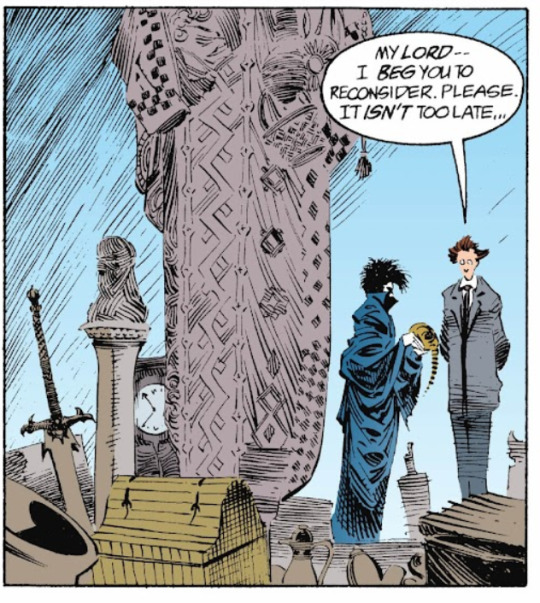
Brief Lives - before seeking Destruction:
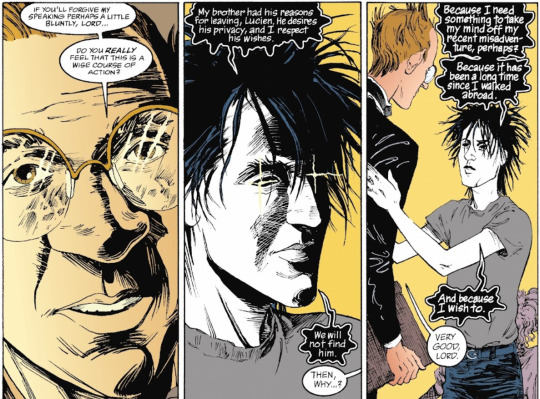
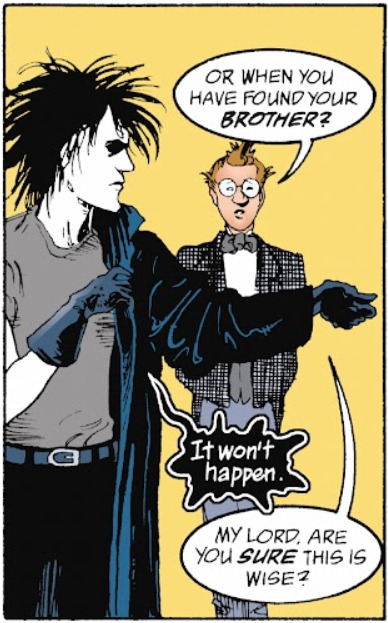
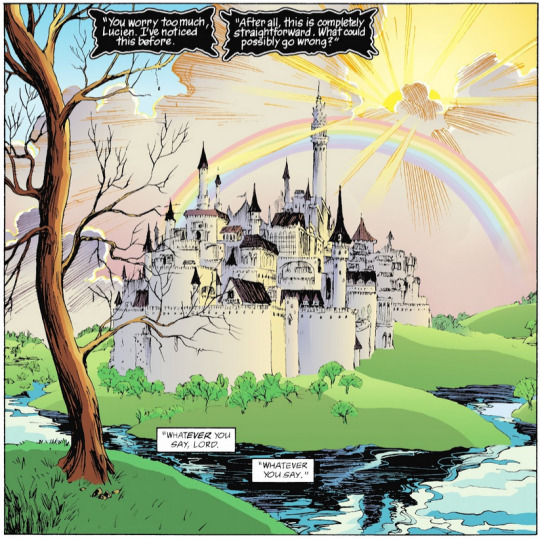
You'll note that in both these times Lucien's words of caution are completely ignored.
You'll also notice that in both times Lucien is taking a path of polite caution. Lucien very rarely speaks his mind to Morpheus, because he knows it won't get him very far to do so. The only time Lucien truly loses his cool and speaks freely is in The Kindly Ones (spoiler alert)
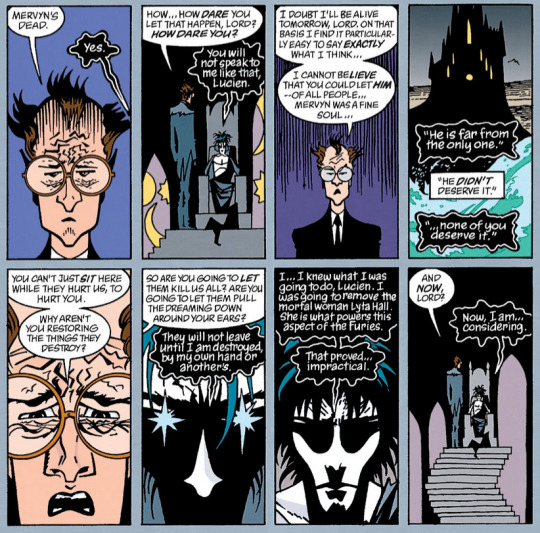
At this point in the comic story Morpheus has basically all but given up and accepted his fate and its fucking depressing AF. Lucien is well within his right to shake the bastard HARD and snap him TF out of it. I STILL think he was too restrained here tbh!
My point here is that Lucienne already speaks her mind quite freely around Morpheus in the show. She expresses her opinions and thoughts and gives him her advice. This is such a well established dynamic by the point of the argument that it is clear that Lucienne is offended by Morpheus's dismissal of her.
Take this exchange from episode 9:
Lucienne: "Rose is weakening the walls between realms"
Matthew: "You gonna tell the Boss?"
Lucienne: "No."
Matthew: "No?"
Lucienne: "It's none of my business."
Matthew: "Er, since WHEN?"
Lucienne: "Since Lord Morpheus reminded me that I'm merely a librarian and should concern myself with my books from now on."
Matthew: "He said that?! What's wrong with him!"
Lucienne: "Nothing is wrong with him. He's always been this way. He's just been away so long I'd forgotten. He's determined to deal with the vortex and the missing Arcana by himself. Without anyones help. So any news must be reported directly and exclusively to him."
It's worth pointing out here that whilst this is framed as Morpheus being a stubborn idiot, in the comic, he does in fact deal with the vortex and the missing Arcana by himself mostly and is not so much helped but saved at the last moment by Unity Kinkaid who realises what is happening in a dream and goes to save Rose, which also saves Morpheus from Desire's trap.
In the show, Morpheus has people who care enough about him and his realm to want to get involved and help him, not out of a desire to undermine him, but simply because they care about him. That is a drastic change from the comic at this point. Morpheus in the comic is constantly shown to be struggling under the burden of his own responsibilities and this is highlighted by the fact that he doesn't really get any support or assistance, and is far too prideful to ask for it. Lucien gets the promotion and chance to rule in his absence, but it is never framed as a job he shares with Morpheus - at no point does Lucien take the burden of his responsibilities off of him. This is no Samwise Gamgee "I can carry you" moment unfortunately. Lucien does not have the power nor the bond with Morpheus to undertake such a task because Morpheus keeps him at arms length throughout the comics - but Lucienne? Well, time will tell how that may change.
An Apology from the King
In a shock horror twist that comic!Morpheus would sooner die than do himself (ha) the great emo King of the Netflix universe gives Lucienne an apology for his behaviour (sort of).
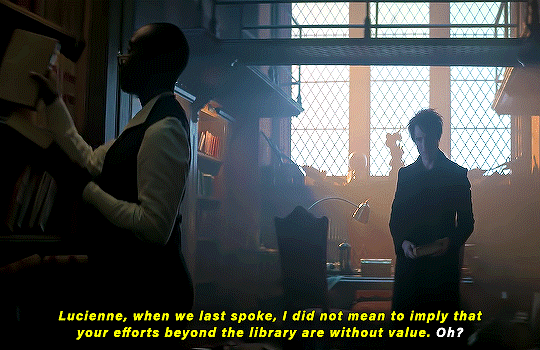
Episode 9 displays the tension between Morpheus and Lucienne following their "break up" perfectly. Morpheus is clearly in the wrong, and Lucienne is clearly hurt by his dismissal of her support. Yet even after the fight, he still seeks out her advice in determining the cause of the disturbances in the Dreaming. He goes to her first before investigating himself (something that comic!Morpheus wouldn't even consider doing) and is surprisingly capable in swallowing his pride here even though it is clearly a struggle for him.
Later in the episode, once he realises that Lucienne was right about the disturbances, he seeks her out to tell her so, and to confirm that she was right and he was wrong. This is again something that I can't fathom comic!Morpheus doing, even nearer the end of the story I don't believe he does so, certainly not to Lucien. Fiddlers Green drums this point home when he says this:
Fiddlers Green: "... still his time there appears to have changed him as it has changed me."
Lucienne: "How so?"
Fiddlers Green: "Lucienne, he came to you and told you he was wrong. It was very nearly an apology. The Morpheus I knew was incapable of that."
This further reinforces not just how much Morpheus has changed in a short time, but also how much he respects and cares about Lucienne and their continued relationship.
Platonic Life Partners? Co Ruler and Closest Confident of the Dream King
When I set out to write this meta, it was with the aim to highlight Lucienne's elevated role from her comic counterpart. To try to stress the importance of her character in the show and what this means for the future of the story in the show. By the end of the last episode, Lucienne is practically granted co-ruler status of the Dreaming while Morpheus works on his creations. He asks her if she can "take care of things while he works" which she agrees "with pleasure".
I just... I can NOT stress ENOUGH how much comic!Morpheus needed this person in his life. Even though Lucien looks after the Dreaming whilst Morpheus is away in Season of Mists and Brief Lives, it is always as a last resort with Morpheus continuing to check in on Lucien during Brief Lives as if he expects trouble, and he always seems a bit confused when Lucien tells him all is fine. As if he can't quite understand how the Dreaming could be okay without him there (and I mean, after the trauma of watching your realm which is also technically a part of you crumble to dust I suppose you would be a bit attached to it!).
Comic!Morpheus constantly struggles under the weight of his responsibility. His entire thing is that he is desperate to step away and not be who he is but he simply does not have it in him to do that. He is far too bound by his rules and responsibilities. For Morpheus in the show to be given someone to support him in his rule as King and assist him with the burden of his responsibilities is actually a hugely mindblowing change to the comic, and could honestly have huge repercussions on the story going forward. Not only that, but the Morpheus in the comics is painfully lonely. He desperately needs companionship but he keeps everyone at arms length. He never allows his subjects to get too close to him, even Lucien. Even Matthew isn't afforded the same level of closeness in the comics as he is in the show. In the comics, the ONLY character who Morpheus is close to is Death. Which says a lot by itself. The second character he gets closer to as time goes on is Delirium. Which also says a lot. Think of the characters in terms of their concepts. Morpheus has no close friends in the comics (even his relationship with Hob Gadling in the comic doesn't have half the impact it does in the show) and keeps all those he interacts with at arms length except for Delirium and Death.
But show!Morpheus? He has a Matthew who is already so very devoted to him, a Hob Gadling who waited an extra 33 years on hope alone that he would return to him, and a Lucienne who rules by his side, offers him support, guidance, counsel, companionship and probably a good helping of love. How can this Morpheus possibly carry the same deep loneliness as his comic counterpart? How can this Morpheus be buckling under the weight of his duties when he already has his Samwise Gamgee right there by his side? It poses an interesting question for how the show will handle future story arcs, though it could all prove to simply make for a much more painful story, where we happen to have many more characters to react and show the deeply painful grief that we all feel at his eventual passing - or maybe, just maybe, this is a universe where Hope never died...
#the sandman#dream of the endless#lucienne the librarian#lucien the librarian#sandman meta#sandman analysis#sandman comic spoilers#sandman speculation#dreaming librarian day#lucienne the sandman#this got away from me a bit#and it is 1am and I am posting it#even though it prob needs an edit#but i set out to post today and i damn well will#well its still today in america anyway#I hope you all enjoy this#now i plan to go visit the dreaming#goodnight and sweet dreams zzzzzzz
91 notes
·
View notes
Text
Why is Jax so upset at the end of Episode 2?
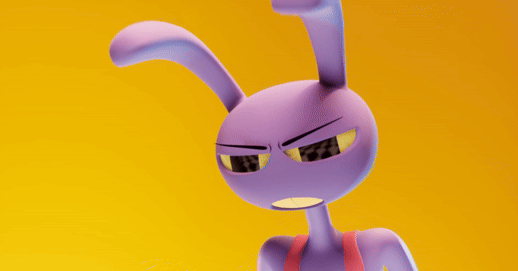
He’s disappointed for the lack of violence, sure, but in the end he looks truly down. I wonder if he feels disconnected from the group? He was the only one not present at Kaufmo’s funeral and he doesn’t seem to really value anyone else in the cast - he moreso just uses them for his own entertainment and ends. While this is at least partially his own fault for being such an asshole man-baby, it can’t help with the feeling of isolation and rejection, feeling like he’s the only one worth his salt on the team, and that he has nobody to relate to or connect with, even in a situation where it’s natural to grow closer as a result of shared traumatic experience and living quarters. Essentially - he might feel like he’s the only one truly alone while everyone else seems to become dearer to each other, even if that feeling is because he views himself as superior.
His lack of ability to connect could also be because he feels like he doesn’t deserve it, of course. He clearly has issues with his ego; this could be because he thinks so highly of himself that the real him can’t compare, causing him to defend his status as “better than the rest” in order to protect himself from recognizing the difference between his perceived status and the reality of who he is. This could also be because he’s self aware that he’s an asshole and doesn’t know how to change or cope more healthily, so he just pushes everyone away and continues hurting them instead of improving. In the first case, he seems to struggle with some real narcissistic traits and clearly needs help - he also needs help in the second case, but it seems like his behaviors there stem less from blatantly narcissistic beliefs and more from his response to the trauma of the circus. Both cases could exist within the same character as well, even if only at different times.
Either way, he clearly needs a lot of support, a better outlet for his feelings, and some sort of reality check that actually gets through to him. He’s very young still, only being in his early 20s, so I think it’s a real possibility that his more cruel behaviors stem from lack of experience and knowledge about other people/social relations rather than from pure malice. We also don’t know how long he’s been trapped in the circus - if he already had some of these ego problems before he entered, it can’t have helped his mentality. I hope he realizes he needs to change and improve himself to improve his life and that he gets the support he needs throughout the show! I can’t wait to see more of him and his character development.
Anyways, I loved episode 2 and I want to see Zooble’s figurine collection
#Ted talk#amazing digital circus#tadc#tadc jax#Jax#character analysis#this is more or less just a stream of consciousness so idk if I should tag this as an analysis or not#it technically is - even if it’s not well done - so I suppose I’ll tag it as such loll#the amazing digital circus#also if you read through all of this I love you forever and I hope you enjoyed!!#I’d be overjoyed for someone to tell me what they think - either about my analysis or his character in general#my posts#my writing#tadc episode 2
74 notes
·
View notes
Text
Anyone ever think about the idea that the mimic is mimicking what it did to gregory before being trapped?
probably, I'm sure I'm not the only person to think about this. but am I going to talk about it anyway? absolutely.
Okay so basically.. a couple of the mimic's voicelines are copy-pasted from Security Breach, right? While this is the first time we've seen the mimic copy anyone before, I believe most of his voicelines do come from somewhere. Sorry, that sounds vague. What I mean by that is I don't believe everything the mimic says is 100% a lie it created.
For example a lot of people joke about the mimic being more whiny when pretending to be Gregory. Joking about how it's the biggest red flag because Gregory was never really that scared in Security Breach. But did it really just come up with that on its own? What if it's mimicking Gregory in the state he was in when he left? What if Gregory was that scared when dealing with the mimic?
And it's not just that, I think some voicelines actually give a bit of hint to this too.


"Help! Something grabbed me! It won't let me go!"
I feel like this line and others like it may actually describe what the mimic did. The way Gregory refers to the mimic as "that thing," and the only other 'thing' it could be pretending to be afraid of is the blob, which already tunneled out by the time Cassie gets here. And while the mimic isn't the best at keeping its story straight..
(Claiming to be running/hiding from Roxy while it's trapped under the sinkhole, though I believe that could be him trying to cover up the real Gregory attempting to speak to her, regaining control of the situation. After all if that voice line was the mimic why would Roxy run in the opposite direction of the walkie talkie to go chase him?)
I feel like if the mimic was pretending it was the blob that grabbed him, he wouldn't also admit that it tunneled out later on. (I'll get to that don't worry.) Sure, this is a fabricated lie to lure Cassie, but my point is, what story is the mimic trying to create here? What is the mimic trying to claim happened to it/Gregory?
I was going to bring these screenshots up later, but..
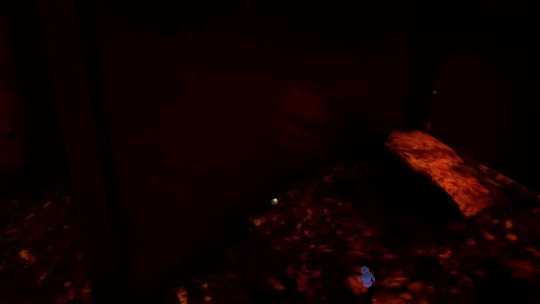

(Original screenshot + edited version to see the handprint better.)
The handprint on the vent outside where the mimic is trapped, with Gregory's backpack underneath it, if you haven't seen theories about it already it seems to clearly imply Gregory lured the mimic in through the vent, that's his handprint.
Why I'm bringing this up here though, that handprint looks bloody, doesn't it? Maybe it's just me, maybe it's just the lighting, but I feel like that looks more like a bloody/liquid stain smear than a smear of dust or something.
So what if what happened was what the mimic described? It grabbed Gregory, and didn't let him go, causing his arms to get stabbed through and bleed after he escaped through the vent.
(If you can't picture what I'm saying or just want a cool visual of this happening, go see this post it's cool and basically shows what I'm talking about, I only thought of this detail because of their post, also the art is cool.)
Anyway, moving on..

"That thing is here again. I gotta hide. Save me."
What if getting the mimic to that specific room wasn't all of the luring Gregory had to do? What if he periodically had to deal with being chased/hunted by the mimic while trying to get it to follow him to that area of the pizzaplex?
(This is probably the most speculation, there's not a lot you can get from this line, but it's still a cool idea I think.)
OR, an alternate take.. The mimic is being interrupted by the real Gregory's attempts to reach Cassie, and the mimic is using this opportunity as an excuse while it attempts to block his signal.
(I've theorized about the differences between each speaking a bit before, but basically, I find it notable that the only times the real Gregory seems to get through to Cassie is when the mimic is busy/distracted/unavailable. So the mimic likely has to make an active effort to block his attempts, hence why he ends up using other signals to try to reach her, like the hacked staff bot. Again this is heavy speculation, but I find it interesting if he's basically telling the story in real-time and sort of swapping him and Gregory.)
Overall there's not a lot you can gather out of this line that I haven't already mentioned in the previous one, so let's move on.
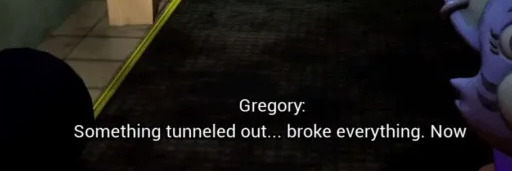

"Something tunneled out.. broke everything. Now I'm stuck here!"
Before I go over this, take it with a grain of salt. Yes I think this is him referring to the blob tunneling out, causing the 'earthquake' that broke the pizzaplex to the state it's in when Cassie arrives. Considering the tunnel in the sinkhole and seeing the blob in a tunnel early in the game, this adds up.
However.. I think there might be a double meaning here. It's a bit of a reach, but what if it's also referring to Gregory a bit here? "Something tunneled out," it's implied Gregory used the vent (sort of a tunnel) to escape the room the mimic is trapped in. "Broke everything," ruined the mimic's plans. "Now I'm stuck here," well, that's self explanitory. Gregory used the vent to escape, ruined the mimic's plans, and trapped it there. I also find it interesting this seems to be the final time the mimic mentions something else down there with it.
(Even during its final pleas in Roxy Raceway, it only says "Save me, it's so dark down here." Nothing about that "thing" putting him in danger.)
Do I think this line is specifically the mimic talking about Gregory? No, I think its main purpose is to explain where the blob went. But I do think it's possible there's a double meaning to it, intentional or not..
Like I said that's the last line of dialogue where the mimic mentions something else down there with it, so there's not a lot more to talk about. My biggest points and evidence were in the beginning tbh, it probably would've been best to cover it at the end of this post but I wanted to go over the voice lines in chronological order to when they appear in-game. I know some of the stuff I said is reaching a bit, I'm not 100% confident that'd be the correct interpretation.. but it's something to think about, that's my point. Whether I'm right or wrong I think the theory is worth considering.
If you read this far, that's cool, I hope this was entertaining or had some kind of value to you. I like writing analysis stuff like this so it's always nice when other people enjoy it too. :)
#ok tag time uhhh#fnaf#fnaf theory#fnaf analysis#fnaf ruin#fnaf ruin dlc#security breach ruin#ruin dlc#fnaf mimic#fnaf gregory#does this count as sb tag since it's the dlc..#fnaf security breach#security breach#fnaf sb#well that's all the tags i can think of#hope you enjoyed :)
99 notes
·
View notes
Note
hey u know how mk only calls wukong by his title and never his name? and how wukong rarely if ever calls mk "mk," instead usually opting for "kid" or "bud?" and how both of those things are kind of representative of their relationship and how both of them care about each other a lot but they aren't honest with each other or with themselves about the other and how neither of them really wants to confront the fact that the other is a person with flaws and struggles? haha yeah <- normal <- lying about being normal
be glad i have been released from class now :) [narrator: she would later find herself late to her 2nd class while writing this]
so happy you have given me this excuse to talk about— i mean, yes! it is super normal to be thinking about this all the time and be comsumed by it and let me explain why:
i will start by going off on a tangent about names and labels and their narratove importance in stories because i love them and have a problem. (idk the word count here. viewer discretion is advized. i just wrote. it is long. beware)
In the Case of Names: a Sunburst Duo Essay
by Yours Truly <3
In the Case of Names in LMK: a Summary (please for the love of pete be a summary)
Ok, so, let me give y'all a quick overview (i failed. this is you're only warning. i failed, and this became a monster of an essay. run while you still have the chan—) of names in the literary sense. When studying novels and books and shit in your literature classes, you will notice that your professor might discuss the importance or ill-importance of characters' names in the story. For example: in the classic novel Fahrenheit 451, the protagonist's name is fucking Guy Montage to illustrate how he's just some fucking guy, a John Doe, a man stuck and complicit in the dystopian world.
You get me? No? Sorry, you want more examples? Fine then :3 let me introduce you to a story called Hard Times by Charles Dickens. It is an allegorical novel that criticized the utilitarian movement going on in dear old Great Britain in the 19th century thanks to the Industrial Revolution. Some fun characters were Johannes Bounderby and Thomas Gradgrind. Tell me, what images did you imagine when I gave you those names? Did you think of a bouncing ball for Bounderby? Were you imagining something square or maybe a mechanical grinder for Mr. Gradgrind?
Remarkable isn't it. The way choosing a name has on a reader/audience's perception of the character. Names are not just placeholders for a character. Names are the identity of that character. Names can establish their starting arc or their ending. Names can be visual in the sense that they invoke a strong idea of what a character might resemble or what themes they will present the audience with. Removing a character's name also removes their identity.
Remember that.
Anyway, I have talked enough about names in the general literary sense. Let us move on to LMK.
Given that this show is based off of Journey to the West (JTTW), many of the names of the antagonist are already provided, and their English translation is pretty literal (Demon Bull King, Lady Bone Demon, Red Son) with some exceptions (Jing & Yin, the Gold and Silver Demons), but their names all provide a description of what they are and how they should be viewed. Spider Queen is a spider demon and views herself as queen. Pretty solid characterization there. Lady Bone Demon, she's a bone demon and has enough rank to be considered a lady (or that could just be to ID that she is a woman but eh). Princess Iron Fan: she's a celestial princess and wields an iron fan. Got it? Good. These examples are simply here to show that a majority of the JTTW antagonists are still fulfilling their roles as antagonistic characters. What I mean is this: since "A Hero is Born," MK has been fighting against the Monkey King's old enemies from the JTTW book. It's like the moment MK inserted himself into the role of successor, the antagonist themselves were inserted to redo their old role of fighting the "Monkey King." It's almost as if nothing has changed beside the fact that their new op enemy is a "human" wielding the legendary staff.
[hmmmm, wait i actually never put this into words until now and it's fitting very well with the whole "MK's fight against Fate/the Narrative" but we'll just put a pin in that.]
However, when it comes to MK's friends (Pigsy, Tang, Sandy, Mei), they all share different names from their reincarnated/ancestral counterparts (Zhu Bajie, Tang Sangzang (they just give Tripitaka a last name lol), Sha Wujing, and Ao Lie). Their identity is separate, distinctive from who they are meant to reflect to the audience. (But look at how Tang still shares the same 1st name to the blessed monk, see how he's the one whose powers are the most similar, see how he being pulled into the direction of emulating the monk, see how much Tang fights it, see—)
Fascinating huh? But let us move on before I forget myself.
In the Case of MK's Names: a Paragraph (DO NOT, i repeat, DO NOT GO OFF THE RAILS)
So, in the English version, there is a running gag about how MK's "real" name is long and complicated, and we don't actually know it. All we know is that MK switched it long before the pilot. And even before MK has that talk with Master Subodhi in s4ep7 (or 6? 8?), I would chuckle at how on the nose his name was. MK the Monkie Kid... how silly of the show writers....ahaha, what a funny little decision to make :)
Do we know why MK changed his name? Other than his original one being long, no. Do we know why MK specifically? We don't know. Maybe, in his fanboy brain for all things Monkey King, MK thought it would be cool to have a name that identified close to his idol. A name that identified with someone he wished to emulate and be as powerful as and felt so connected to. But what do I know? I am a mere local gal who feeds off of metas and theories and all things relating to my beloved sunburst duo.
Then, we have MK's many titles: Monkie Kid (IDs him as the new generations Monkey), Successor (IDs him as the one who will succeed Sun Wukong in both the title of Monkey King and power), Noodle Boy (pronounced "New-dle Boi and IDs as the boy who works in his surrogate/adopted dad's noodle shop), Delivery Boy (his actual job for the noodle shop), and last but not least, Harbinger of Chaos.
What makes a harbinger? What is chaos? What are their intentions? Are they good? Bad? Neutral?
So, I've already defined harbinger before and many others have as well, but to sum up: a harbinger is a being/person/thing that announced the coming of something be it good or bad but most of the time the focus is bad. A "Harbinger of Chaos" then, would be the one to announce the coming of Chaos™️ and the disruption of world order. Is this a bad thing? Well, the show presents it at the moment as so, but that doesn't mean it will be. Honestly, the show has shown order and fixed structures more in a bad light and promotes free will and choosing a destiny that fits you as the good thing 👀 (another thing to pin in the MK might to go war with Fate)
But now I have established MK's names and must shut up and move on before I no longer can.
In the Case of Sun Wukong's Names: some Paragraphs (STAY ON TARGET PLEASE)
I will admit that my knowledge of names in China is very low, and by low, I mean I know nothing (most of what I do know comes from asking friends and informational sites). So, let me begin this segment with an excerpt of Sun Wukong gaining his name from the book itself :) and break it down with my interpretation and how that is applied to LMK.
When the Patriarch heard this, he was secretly pleased, and said, “Well, evidently you have been created by Heaven and Earth. Get up and show me how you walk.” Snapping erect, the Monkey King scurried around a couple of times. The Patriarch laughed and said, “Though your features are not the most attractive, you do resemble a pignolia-eating monkey (husun). This gives me the idea of taking a surname for you from your appearance. I intended to call you by the name Hu. If I drop the animal radical from this word, what’s left is a compound made up of the two characters, gu and yue. Gu means aged and yue means female, but an aged female cannot reproduce. Therefore, it is better to give you the surname of Sun. If I drop the animal radical from this word, what we have left is the compound of zi and xi. Zi means a boy and xi means a baby, and that name exactly accords with the fundamental Doctrine of the Baby Boy. So your surname will be ‘Sun.’”
When the Monkey King heard this, he was filled with delight. “Splendid! Splendid!” he cried, kowtowing, “At last I know my surname. May the master be even more gracious! Since I have received the surname, let me be given also a personal name..."
..."You will hence be given the religious name ‘Wake-to-the-Void’ (wukong). All right?”
“Splendid! Splendid!” said the Monkey King, laughing. “Henceforth I shall be called Sun Wukong.”
What a fucking cutie <3
So, what can we gather from this excerpt? Sun Wukong just gained his official name. No longer is he a monkey with descriptive titles, no longer is he a monkey without a surname to be referred to as and respected for. He now has both a surname and a personal name. And while I don't fully understand everything Master Subodi listed when naming Sun Wukong, it is important to note the importance of it and how happy Wukong is to receiving it.
Before this, the book would simply refer to Wukong as Shihou (stone monkey) or the Handsome Monkey King. Both of these are descriptive titles that just inform you what Wukong is rather than who, just like with the other demons met in JTTW. But now, we get to know him as Sun Wukong, someone more than his titles and such. There's even an explanation in the preface how Wukong's own personal name has significant meaning or relation to Buddhism, but I won't get too much into that since my knowledge is of that is 0 and I want to try and stick to LMK.
Now then, let us examine Wukong's name in the LMK sense. Literally everyone in the show call him either Monkey King or "simian" (and if he really pissed them off, Sun Wukong). The only people to refer to Wukong by his personal name is Nezha, Macaque, and Peng. It is literally just these three. And while we could argue all say it like "Wukong (derogatory)," I believe Peng's the only one who means it. Meaning, I think Macaque says Wukong because he was the closest friend of SWK, thus that's the only name Macaque would ever call him (sure, he said Monkey King and shit in s1 but that was when he was duping MK soooooooo). Nezha calls him Wukong because after the whole Havoc in Heaven and journey stuff, he is the new oldest member to befriend Wukong and not be enemies with him (yes, he will get annoyed and aggravated by him, and he will not always believe Wukong's intentions are great, but he still cares and is his 2nd closests living friend).
Peng, on the other hand, does not give a shit. I fully believe that guy never cared for Wukong. They only joined the brotherhood because of Azure (they even offered for Azure to be the brotherhood's leader). I do not think Peng cares for formalities when it comes to people they dislike. We could argue that maybe Peng cared for Wukong in the beginning, but I do, honestly, not believe it. The only reason Peng even felt betrayed was because it messed up Azure's plan. Not because the two were sworn brothers.
But yeah, very few characters actually call Sun Wukong by his name, and when they do, it establishes not just how close they are/were, but also how long they've known each other. It's the same thing with how Wukong refers to others. He barely calls Pigsy, Tang, and Sandy by their names. He will give people nicknames and shit just to place a safe distance from them because of his own very unhealthy attachment issues.
In the Case of MK and SWK's Names for Each Other: the Actual Sunburst Duo Essay (you are free now.....)
Speaking of attachment issues, let's talk about the Sunburst Duo and how much these two need to sit down and talk.
So, we have discussed how names are integral to identifying a character's purpose, thematic journey, description. We have discussed how a person's title can clue in on certain characterization, present or future, and how they demonstrate the way others view them. Now let us apply this to our beloved sunburst duo.
As mentioned in your ask, @gumy-shark, both MK and Sun Wukong barely call each other by name (MK never has as far as I am aware, and SWK has done so only a few). It's "Monkey King" from MK and "kid," "bud," "buddy" from SWK. Rarely do the two ever think to say each other's name.
In the beginning, I originally thought MK only calls Wukong "Monkey King" as a way to be respectful, and with Wukong, I assumed he called MK "kid" simply because MK was very young to him. However, as we get into s3, and especially s4, MK and Wukong have grown a lot closer. Neither of them see each other as just a mentor or student but as friends. And yet, they cannot seem to stop calling each other by their title or nickname.
Thus, the distance is still there. S3 ends with Wukong promising to do better as a mentor and be more honest with MK, and we do seem him attempt this. He gives out more praises, he's more open about his feelings and then gets sucked into the memory scroll. But here's the kicker: the two are doing a reverse in their dynamic.
When it starts out, it is Monkey King who establishes the line between the two. He will simply be MK's mentor and teach him all the kid has to know in order to succeed him. MK is ecstatic to even be near SWK. This is his idol, the guy he's had a special interest in for years probably. He now gets to train under the Monkey King. He wants to do good. He wants to kickass. He wants to be just like him.
But as the story goes on, we see SWK open up to MK more and care for him deeply and want to protect him, and we see MK uncover the skeletons in SWK's closet and feel so alone and learn that the power he used to wish for is not what he expected. And in the aftermath of s3, it is now SWK who is opening up and trying to help kindle and safely guide their friendship in a healthier path(ish). It is SWK who is placing his own protege on a pedestal because "loook at him! isn't he so great and powerful! he will help this world a lot more than i did". It is SWK who is disregarding th original rules he placed. But now ,it is MK who is keeping the distance more than SWK. It is MK is trying to force some kind of distance. He feels like he shouldn't burden SWK with his doubts and worries. He is terrified of his own powers and their capabilities and worries his actions will make the same mistake as his mentor.
With s3 and s4, SWK has called MK by name quite a few times. Especially in s4. It's not a lot, but it's definitely more than before. And yet, MK cannot call Wukong by name. Personally, I think he might still feel like he's under Wukong's shadow. As his successor, there is a legacy that he will carry when Wukong actually retires and gives his title to MK (which is what I assume Wukong will do??? It is still unclear what exactly MK's succeeding SWK of). And that legacy is quite the burden. I would not be surprised that MK is unable to place himself as being worthy of taking Wukong's place just yet (if ever).
This guy was his idol for a long time. And with that, you tend to place a high pedestal for those people. MK has given Wukong such a high pedestal, and Wukong is very aware of it. It's why the guy even keeps his distance in the first place, and why he's scared to disappoint him. But, MK has learned so much, has been told of the tales and pain his mentor inflicted on others in the past (a past SWK greatly regrets), and yet cannot find it in himself to lower that pedestal or even allow himself to think about it. Because if he does, then he will have to acknowledge his own pain and his own disappointment in someone he not only admires but has come to love like family. And it is very hard to reckon with the hurt and pain caused by someone you consider family.
So yeah, they are silly monkeys who cannot communicate to save their life and need to just sit down and talk or else this will continue to boil and explode and we'll have a SWK and MK showdown (fuck yeah! i will be crying so hard).
[end of essay]
#was late to my next class because of this#got lost in the sauce that my friend had to text me for me to remember i have CLASS#sigh#hope you enjoyed my scholarly account on names and how they pertain to the sunburst duo#also barely anyone even refers to Tripitaka by name#it's always 'the monk this' or 'the monk that' he only gets called by name if someone is being very formal about it#LITERALLY TRIPITAKA ISN'T EVEN CALLED TRIPITAKA AND IDK WHY#WHY ARE YOU HOLDING OUT LMK EXPLAIN#EXPLAIN YOURSELF#WHY IS TANG'S ANCESTOR BARELY REFERRED TO BY NAME#anyway#there you go#hope you're happy#i used all my brain energy for this#this took me 2 hours to write in total#and that was simply because i chose not to include screencaps from the show itself out of self restraint#lmk#lmk analysis#lmk sunburst duo#lmk sun wukong#lmk mk#lmk qi xiaotian#qi xiaotian#sunburst duo#asks#read more#long post
94 notes
·
View notes
Text
We Drive Each Other Batty
Alenoah Week Day 4: Royalty/Vampire AU
Alejandro Burromuerto is an absolute menace to the kingdom of Wawanakwa. He comes from a legacy of vampires that strive to control as much land as possible. He's only recently set his sights on Wawanakwa, and within a year he's enthralled three towns into being his local blood bank. Life is pretty good for him.
He's so confident in his abilities that he decides to go directly for the castle itself.
Aaaand almost immediately finds himself caught by King Chris's personal bodyguard, Chef, who knocks him unconscious with a pan before he can enthrall Chris.
The smart thing to do would be to kill Alejandro. But Chris is a petty man who prefers humiliating people.
Who better to ask how to do that than his personal court-wizard-in-training who Chris specifically because he's snarky and petty?
Noah gets dragged into this and comes up with an idea. If he likes mind controlling people so much, then let Alejandro be on the other side of things. Tinker with a familiar bonding spell to turn Alejandro into a familiar. He'll be forced to listen to someone else's orders, and can't harm anyone except in defense of his wizard. Plus, if done right, it can have the added benefit of making him 'fun size' thanks to having to categorize Alejandro as a bat to make this work. That way his vampire strength and speed won't be as much of an issue.
There's two problems with this plan.
One, the bond can only be created with a wizard who doesn't have a familiar yet. Most adult wizards do. It's even a requirement to bond with a familiar at some point in a good amount of magic schools.
And two, the bond is usually done with two consenting parties. Since Alejandro would be fighting it the whole time, keeping the familiar bond would be an active effort on the wizard's end. It's possible if you find a wizard with enough power, but good luck trying to convince a wizard to be a spell battery.
"Say, kid. You don't have a familiar yet."
"Mclean. Don't you dare."
"Think of it as a new part of your job description!"
"I'm not going to deal with a psychotic vampire for your sick amusement!"
"Sure you are! Do a good enough job and you might get a better holiday bonus this year!"
Thus Noah has accidentally sealed his fate to being stuck with a 4 inch vampire who is absolutely livid at this humiliation.
They both hate this situation so much. Alejandro can't mind control Noah because that's the first thing Noah ordered him not to do the second Alejandro woke up tiny, confused, and pissed.
Noah can't just leave Alejandro alone in a cage in his room all day because the longer and further he stays away from Alejandro, the weaker the bond and the more likely Alejandro will break free from it.
Alejandro keeps trying to persuade Noah that he's learned his lesson the non-magical way. And Noah shuts him right down because he knows that's a lie.
If Alejandro's really being difficult, Noah has no issues with throwing him into a bird cage and ordering him to shut up for a while. Noah really wishes he could just order him to shut up forever, but Alejandro starts fighting against the bond even worse when he can't speak, which usually ends up giving Noah a headache. Temporary relief is the best he can manage.
That and taking him to Chris to see what humiliation Chris and Chef have decided to put Alejandro through for the day. That usually brighten's Noah's day.
Alejandro still gets his own little revenges in. He looks for every loophole under the sun within Noah's orders. He banters at every given opportunity.
He'd love to give backhanded compliments to Noah in front of people that aren't Chris and Chef. However, no one else is allowed to know that Alejandro is still alive.
Letting a vampire live is a big no-no, even if Chris approved of it. Vampires still need generous amounts of blood to survive. Animal blood works somewhat, but it's more like living off rations. Vampires can only get full nutritional value from a human. Which doesn't really endear humans to vampires. (Part of Noah's job is to let Alejandro feed from his as well. It feels more like four little needles than a serious bite, and thanks to Alejandro's new size he doesn't feel that woozy when Alejandro has had his fill. Noah doesn't mind it nearly as much as he pretends to.)
Plus, Alejandro did get some of his hooks outside of the castle, so there's a decent chance someone could recognize him and decide to take advantage of the fact he's easily killable. So when around others, he takes full bat form and pretends to be a regular familiar. He's lucky he can at least talk with Noah telepathically so he doesn't have to be completely mute.
Still, it's not all bad. Now that Alejandro is, magically speaking, a bat, he can actually experience sunlight. He'd always used the metaphor 'you're as radiant as the sun' when charming others. It's a different thing entirely to actually feel its warmth.
Noah takes notice the first time when Alejandro is completely silent for once. He sees Alejandro staring directly at the sun in awe. He actually looks kind of cute sweet like that.
Except Alejandro is staring directly at the sun, and so Noah has to snap Alejandro out of it. He isn't just going to someone blind themselves, even if it is Alejandro. It's almost a shame to see the mask fall back on his face. (Too bad he didn't notice the flicker of shock at someone showing concern for Alejandro's wellbeing.)
With forced proximity, the two start to learn more about each other.
Alejandro learns about Noah first since he can't help but observe the fact that Noah is reading textbooks, but he hasn't seen Noah attend school once. When Noah isn't reading, he's catering to Chris and Chef's whims.
Noah still seems to be doing just fine, though. He knows Noah is advanced for his age based on what he's reading and how much he gloats about it. Still, if he was advanced than Alejandro would expect a tutor to be guiding Noah along to suit his level. The only adults he's seen consistently during his stay with Noah is Chris and Chef.
Alejandro points this out to Noah, and receives a long rant from Noah in return.
See, Noah's completely self taught. Before Chris, his family couldn't afford to get him a tutor. This isn't inherently a problem. Some wizards will take on apprentices for their service rather than for payment if they see potential in a particular student.
The problem is no one wants to teach a child who wants to learn dark magic. Nobody that Noah would ever want to meet, at least.
Noah could lie about not wanting to learn forbidden magic. But he'd always risk getting caught by whoever's training him. Not to mention the risk of getting himself killed because he was performing something dangerous without anyone to save him.
Plus, he considers it incredibly stupid that dark magic is a taboo subject to learn. The reason why creatures like Alejandro get away undetected for so long is because everyone else is more than happy to stick their heads in the sand. Their solution to combat evil is to simply not talk about it. As if that's just going to make it magically go away.
The only real way to learn how to counter it is to study it. It's like how making an antidote for a poison requires a bit of the poison itself so your body knows what to fight against.
Hell, it could even be used for good! Even something like Alejandro's hypnotism. It can lull a growing angry mob to not be stupid. It can force a different evil bastard to do something good.
But no, people like Alejandro screw it over for everyone else, and now any time he tries to make these arguments he's 'the bad guy' or 'should be barred from magic for everyone's good'.
Noah got lucky. Chef found him when he was insulting yet another wizard who shot down his chance at apprenticeship. He might have forgotten angering someone who can throw fireballs isn't the best way to guarantee your own safety.
Chef dragged him away and attempted to yell some sense into him. When it was clear that Noah was still just as defiant, he dragged him directly to Chris. Who ended up liking his spite and sarcasm, and offered him the job of court-wizard in training. It was hard for Chris to find any wizard willing to stay with him too long. And he's got plenty of dark magic crap that he has stored away. Both of them get what they want!
Noah wouldn't learn how demanding Chris was and how he'd make people put a lot of effort into stupid tasks that drive less patient people mad until later.
He took the deal because it was the best he was going to get. He knows he's being underpaid compared to what a regular court magician would be making. But for as much as Chris is a pain of a boss, he's given Noah exactly what he's wanted. He'd dare to say that Chris and Chef cared about him. Though Noah will refuse to say if he feels the same way about them.
Alejandro can't help but admire Noah for that. Deep down past that apathetic, snarky exterior, there is someone who's capable of ambition. Or at least capable of using spite as a motivator.
Alejandro's mask slips as he ends up sharing how he can relate. He gives off the airs of a vampire who's been around for at least a century or two. Truth be told, he's only a couple of months older than Noah. He's aging as a human would, for now.
He, and his lineage, are born vampires rather than bitten. Hence how he can have multiple thralls at once and transform into mist or a variety of animals. Bitten vampires are lucky to be able to hypnotize one person, and are typically limited to the advanced strength and speed.
So he can certainly one up the average vampire...but not other born vampires. Or vampires who have actually lived for centuries. He's still considered nothing more than an insolent child not to be taken seriously.
He does have the expectation on him to expand the Burromuerto influence. But he's constantly being compared to other relatives and their accomplishments. Particularly that of his brother José who has a couple of decades over Alejandro's head.
Alejandro has been working hard to close the power gap. He's been training to be as strong and fast as possible. His hypnosis works so well because he put in the work to learn how to actually charm people. The magic is to make sure the feeling stays for longer than it would naturally. But getting people to do what he wants? All him.
And it's still not enough for anyone else. So he decided to get a headstart on the family tradition. He was supposed to wait until he came of age, but he was already strong and confident in himself. Going off and succeeding early would prove everyone else wrong.
He'd been doing so well, too. He hadn't even needed to kill anybody. Unlike most of his family, he doesn't particularly care for it. Not because he cares that much about humans. But because he sees it as a waste of a resource. Sure, you can inspire fear into others with a death. But that fear can easily turn into outrage, and rebellion. It will be harder to control a population that is actively working to fight against you. Much easier to charm them and have them not even realize anything is wrong. Everyone is alive, and there is nothing to worry about. They just have to give a bit of blood every once in a while. And for that, Alejandro would make sure nothing else would dare to touch them.
That last part of the story concerns Noah. A lot. But it's...nice? That Alejandro cares? Enough to value a human life. Considering the rest of his family, it's a miracle Alejandro's got anything resembling compassion.
And at least he's finally being honest about something for once. Noah prefers honest but callous to kind but insincere. This part of Alejandro's still concerning...but he likes it more.
It's the start of these two doing more than just argue with each other. Alejandro's still not happy about being small. He complains about it just as constantly. But it's no longer lashing out at Noah. Noah doesn't really throw him into the time out cage anymore. Alejandro is gentler when he bites into Noah's neck to feast. Noah is less tense when it happens. He leans into it more. They bicker still, but they're actually willing to work with each other.
It's how they figure out a loophole. Neither can't really use their own magics to their full potential anymore....but they do now have access to each other's magic. They just have to be willing to train each other in it.
On Noah's side, Alejandro is trying to teach him how to hypnotize others through charming them. It doesn't go well. Noah's terrible at giving compliments. Changing his wardrobe to accentuate Noah's looks doesn't help when he doesn't flaunt them. That shopping trip to get Noah a new outfit definitely didn't awaken anything in Alejandro. Except it does. Noah is indulging him in one of his favorite activities. He looks cute in some outfits, hot in others. Noah mocks, Noah teases, Noah banters. It's just Noah, actually. Noah's cute, and he's also hot. Oh no. Alejandro's got himself a crush. ...MOVING ON FROM THAT-
Eventually, it clicks. This isn't working because Alejandro is teaching Noah how to be a Burromuerto. Which Noah certainly isn't. To charm someone, you have to work with what you naturally have and exaggerate it. Noah has snark. Use that to insult people that his victims would hate, not the victim themselves. Nobody likes being insulted, but everyone has something that they love gossiping about. That's Noah's in to get others to open up.
Then, there's the actual ask. Noah can't directly say what he wants all the time. Sometimes that may work, but sometimes what he wants is directly opposite to what someone else wants. He can find out when it's safe to be direct or not through gossiping. Then, if it's not safe? Make them feel safe. People underestimate Noah because of his age and figure. Use that.
Noah's just a pathetic, cute scrungly little guy who doesn't do much. What's the harm in letting him take a dangerously powerful grimoire off your hands? He's not going to do much with it. He's just curious.
Noah grins with pride the day he's able to hypnotize a guard who constantly abuses their power into humiliating himself.
On Alejandro's side, Noah's willing to teach him shadow magic. He wants to start with teaching Alejandro how to change their shape, and then move on up to making them solid.
There is also teleporting through shadow, but Noah's not teaching him that. That would give Alejandro the ability to leave Noah. Which would be bad for the whole 'keep Alejandro in check thing'. For no other reason. Noah wouldn't miss him. Not one bit. They just have to stay together for practicality. That's all. Let's get back to talking about shadows.
Alejandro assumes this should be a piece of cake. It's just another form of manipulating, just with a thing rather than a person.
He's terrible at it.
He coaxes, he begs, he pleads with the shadow to just move, and it refuses him. He's cursing in Spanish at an inanimate object.
Noah laughs at him for this. This earns Noah some curse words.
Noah tells him to stop treating magic like it's a person to be charmed. It's not. It's a thing. It follows orders so far as you figure out the right language. You tell it what you want, and then it gives it to you. No convincing, no tricking. Just asking.
Alejandro can't ask for one thing when he means another. That just confuses the magic and makes things not work. He needs to be direct for once in his life. Trust in his own ability to make something happen. Not in his ability to trick someone else into making something happen.
It takes Alejandro a while to just ask the magic to do what he wants.
I can't figure out how it'd work on Alejandro's side yet. Probably because I haven't yet defined the kind of magic he can do. 'Standard wizard fair' isn't going to cut it if this is coming from a personal bond/something that's intrinsic to Noah that would simply take a different form with Alejandro. It'd definitely have something to do with tying into how Alejandro doesn't actually NEED to charm people/force them to like him to get what he wants. His problem would definitely be that he's trying to force the magic to go exactly how he wants it to go. But magic's not something that likes being tamed like that. So Alejandros's got to learn to effectively say what he wants and just trust in his own abilities enough to make it happen.
When he does?
Alejandro shows off with a little shadow puppet show. He orchestrates puppets no bigger than him from atop Noah's bookshelf. It's endearing, it's sincere, and Noah is screwed because he is in love with this little vampire.
The more they teach each other, the stronger they grow. Neither realize it, but the bond is no longer draining each other.
They learn about this when someone attempts to mug Noah when he's running one of Chris's errands. The mugger grabs an Alejandro in bat form and slams him against stone to stop Noah from using magic. Alejandro is alive, but in a daze. Noah immediately makes tendrils of shadows to fling the mugger into the nearest wall, then hold them aloft in the air. He's running for Alejandro who's mumbling, asking if Noah is alright.
Noah doesn't know healing magic, but he's putting all of his focus into figuring out something to help Alejandro. It's working somewhat. Alejandro's head is clearer, though his body is still damaged. Noah puts more effort into making sure all of Alejandro is better. So much so that he doesn't notice a second mugger coming to check on their partner, who is now sneaking up on Noah. Noah is grappled before he can react, and is dragged away kicking and shouting.
Alejandro acts before he can think twice about it. The next thing he knows, he's standing at eye level with both of his newest victims. He hisses, his fangs bared, ordering them silent before they can scream about his presence. They are to release Noah and grovel.
The muggers do so without hesitation, their eyes glazed over. Alejandro wraps his arms around Noah in a hug. His grip is tight. He is at his full strength and could crush whoever he desired. He is gentle with his querido and plants a kiss on his forehead.
Alejandro wants so badly to drain them dry, but Noah takes priority. The muggers are to leave, turn themselves in, and forget the type of magic Noah and Alejandro used, and their faces.
The muggers leave, and the two are left to look each other in the eyes for the first time.
They stare for a while. Neither of them quite sure of what the other wants to do right now. Noah's the one who breaks the silence first.
"This late growth spurt's a bit much, wouldn't you say?"
Alejandro snorts at the absurdity.
They agree to keep the familiar bond as it is. It still lets them communicate with each other telepathically, and lets them use the other's magic.
They'll have to hide the fact that Alejandro is at his full strength, of course. Particularly from Chris and Chef. Alejandro tries and finds out that he can shrink at will now. Truth be told, he doesn't mind it anymore. (He's touch-starved, and rather enjoys being held and pampered by Noah.)
Alejandro also promises not to go enthralling everyone.
"Just five thralls will suffice."
"No."
"Two?"
"No!"
"One? I'll even make it Justin. Just imagine the things we could have him do."
"...No."
"You hesitated!"
"Stop tempting me!"
"Is it really tempting if you were already thinking it?"
"I hate you."
"You love me."
"That's not the point!"
The two stop when they realize that bombshell just got dropped.
They finally have proper confessions and decide to start dating. Alejandro immediately offers to turn Noah into a vampire so they can live together. Noah immediately shuts him down. Alejandro's sad until Noah explains.
One, that's a huge commitment when they've literally just started dating. And two, if Noah did that now then he'd have to be a teenager forever. He hates being a teenager NOW. An eternity of that? Hell no. In the future though? They can come back to this, and Noah'll let him know if he changes his mind.
Alejandro is more than happy to wait.
Fun little side note: Alejandro's got a bat form, and I already know exactly which species he is!
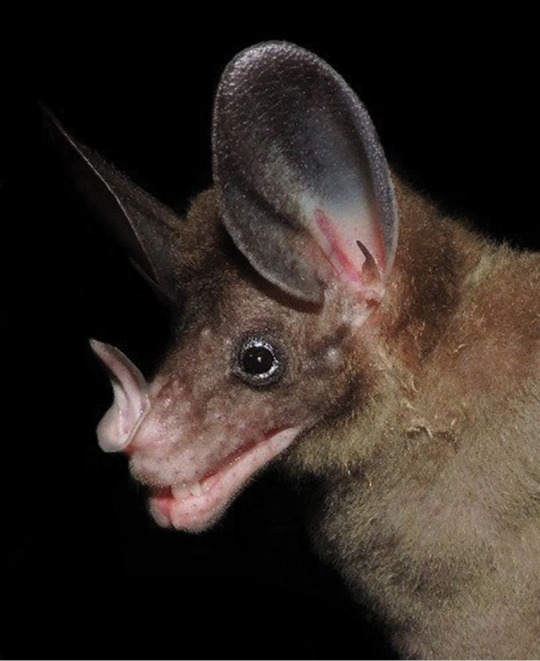
Meet the vampyrum spectrum! Also known as the spectral bat, or the great false vampire bat. They're carnivorous little guys who eat birds, rodents, and uniquely, other kinds of bats! Part of their natural habitat covers Peru, and they're also fun in that while most other bat species are polygynous where it's just one male with multiple females, these guys are mostly monogamous! Perfect for Alejandro!
#i swear this was supposed to just be a comedic au#and then the character analysis mode hit#it was all over from there#still I hope you guys enjoy the imagery of a small Alejandro in a cage shaking at the bards and screeching like a banshee#i know i do#total drama#total drama au#alenoah#total drama alenoah#td alenoah#total drama alejandro#td alejandro#total drama noah#td noah#alejandro burromuerto#vampire au#giant/tiny#giant/tiny au#g/t#alenoah week#alenoah week 2024#alenoahweek2024#2024 alenoah week#we drive each other batty#perp fanfic#fanfiction#total drama fanfiction#total drama fanfic
51 notes
·
View notes
Text
Sacred Realm updated! :D
New chapter new ramble here I am!
Sacred realm has returned with Chapter 4, named The hearald and the gorons, (Considering we start by climbing death mountain this brings me joy.
I'll get the important stuff done, This is done with permission from @zelda-the-sacred-realm, and all art from the comics belongs to the comic artist.
The link to the comic can be found here! Go give it some love it's expertly done! :D
Now, grab some popcorn and a drink, sit down someplace comfortable and have fun!
Lets go!

It absolutely must be said the backgrounds of this comic never cease to amaze me at how detailed they are. I low key almost feel as cold as it looks there. It's damn incredible.
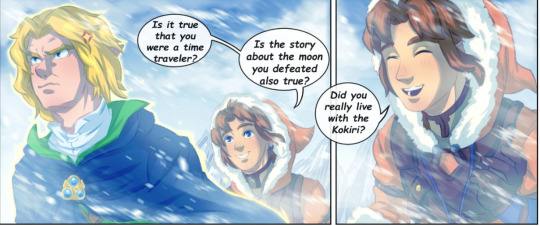
Oh man i love him so much he's so sweet
He's just a curious little bab
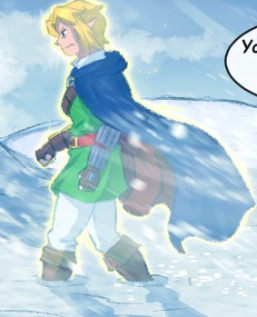
Time really do be >:(

Name drop! :D Huzzah!
Link you innocent bean

Is that who i think it is?
checks notes
IT IS
Okay okay okay Time to do my research. I'll go into it more when we get through the panels with him in.

This is so sweet, Interesting that he knew Twi when he was alive. (Note the lack of fun yellow glow that the other spirits have)
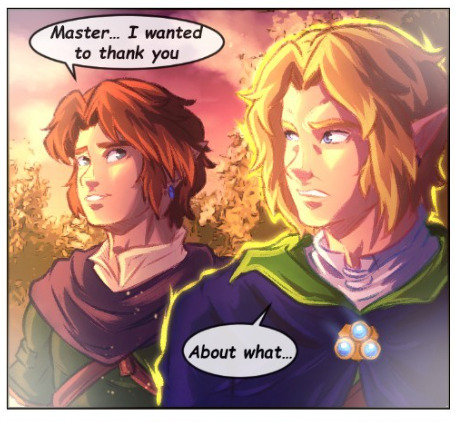
Calling him master. Considering what we know from twilight princess and the hero of time and the hero of twilight this makes a bunch of sense.

Oh he's so pretty
So from my understanding of Twilight's lore, He sees time as a mentor (Hence calling him master.) Twilight seems to be alive here, so i would say that this is either during his actual adventure or just after it, meaning that the area we see around them must be Twilight's time.
(Also Epona beloved)
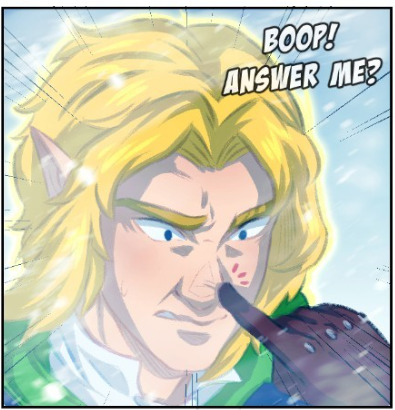
OH MY GOD HE DID IT THE HERO
WE GOT A TIME BOOP IN COMIC IT IS CANON NOW
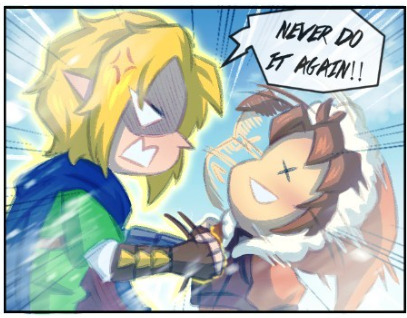
link will 100% do it again, maybe even Twilight will get involved.

Trying to decipher what Sky was saying here was fun, also Sky being protective of Link gives me life okay
Sky truly is the best

God these enemies are so cool!
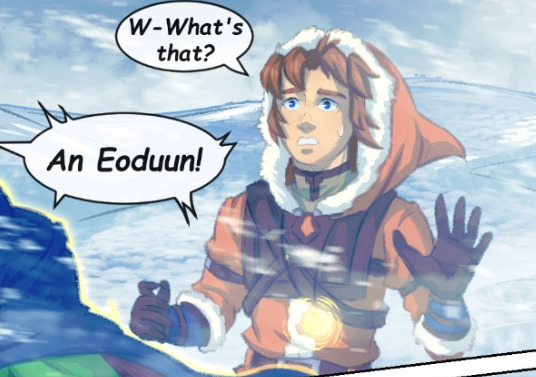
The cinnamon roll needs assistance, is that why he's in orange? Cause he's a little cinnamon roll?
(New headcanon you can't stop me)
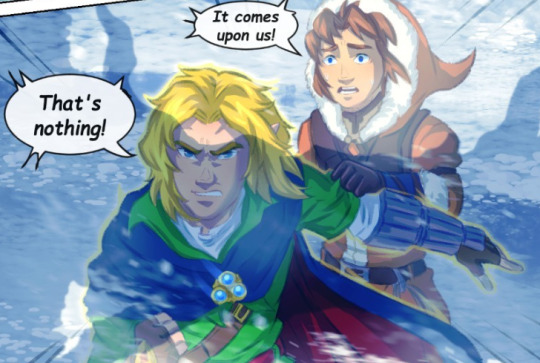
Save him
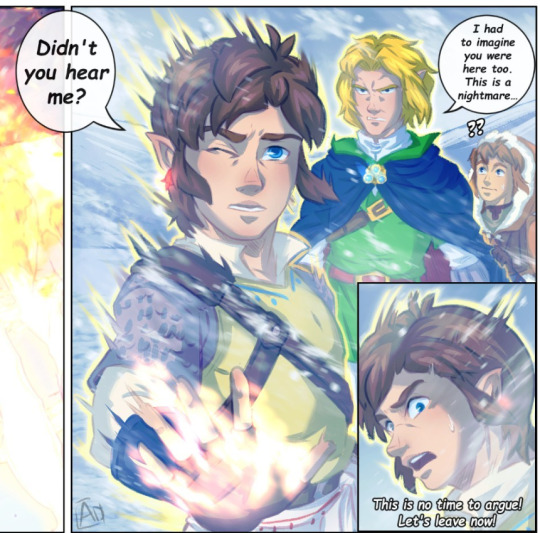
SKYYYYYY
Protective Sky is the best Sky alright
He's so cool!
But the lines I assume are from the spirit barrier from before. Like he's fighting the barrier to be here? Is this gonna hurt Sky to do this? It looks like he's struggling.
I'm going to assume he can't keep this up forever and this is a last resort move.

And Time knowing Sky?! Hello? Makes me wonder if the spirits have been in contact like this.
But I've got a theory about this
I think Time may have not been the only one to aid Twilight. Hence why he knows Sky.
I dont have much to base this on right now but I'm hoping we will see more about this in the next chapter so I can elaborate on this further.
Also look at Link grabbing Time's scarf like he's a toddler, the little question marks are just so adorable and I love this man okay.
Okay, I think thats everything! Thank you so much for hanging out with me as I go through this comic and yell about my faves and the cinnamon roll that is this iteration of link.
And thanks again to the artist for letting me do this!
Hope you have a wonderful day! :D
#comic analysis with major#ramble corner with major#zelda sacred realm#zeldathesacredrealm#sacred realm#sr twilight#loz sr#sr realms#sr time#sr sky#i love this comic#Writing these brings me almost as much joy as Sky does#And that's saying something#because in every iteration dear god does he bring me joy#ztsr#hero of time#hero of sky#hero of realms#sacred realm analysis#:D#hero of twilight#cause we all know thats the boy himself#i am once again rambling at how much i love Sky#cinamon roll link#clearly the orange is to indicate that he is a cinamon roll you cant change my mind on this matter#i dont think there are any tags i forgot#i hope you enjoyed!
36 notes
·
View notes
Text
Izuku Midoriya and confronting a complicated past— an analysis
With the upcoming arc in the anime about to come after next week’s episode, I think that it’s important to talk about Izuku as a character, and everything that has led him to this moment and this particular arc in the series. While there is a lot going on in that Kid’s head, most of the things that directly cause Deku to act the way he does during his vigilante time has been left unsaid and up to the reader to pick up on. This could be seen as sloppy writing, but it could also be seen as a great use of subtlety to create a slow downward spiral for our protagonist that can be incredibly rewarding for readers who take the time to do some extra sleuthing. So before the arc begins, and before the inevitable controversy on whether or not the arc was rushed or came out of nowhere, how about we take a close look at Izuku Midoriya as a character and his depth that is often ignored. Let’s take a peek at how his entire arc is filled with tragedy, hope, and the importance of confronting one’s past. Sit back, grab a snack, and enjoy my first in depth BNHA analysis where I hope to give manga readers who are currently watching the anime some added perspective. Also disclaimer: I love all the characters in this series and will not be bashing on any of them, as I feel as though it would be undermining the messages of the story and the depth of the characters. Nothing I say is meant to be putting down any characters and I am not blaming any single character for Izuku’s struggles. All fans of any characters are safe and welcome to enjoy this.
At the beginning of the series during the very first line from our protagonist, which is something that is supposed to help the audience understand the type of story they are about to read— Izuku says “people are not born equal”. He also states that he learned that fact at the young age of four years old. From the very beginning, Deku was made to believe that he is less than everyone else. Less than those with quirks, and therefore less of a human. Quirks, literally translated from Japanese, mean individuality. To be quirkless, in the eyes of MHA’s society, is to be without a soul. Or at least, that is what can be understood by a small child who simply wants to belong. Therefore, deku internalizes form a young age that he inherently has less value as a quirkless boy, and such internalizing severely damages his perception of himself for the rest of the series. He’s a useless deku that does not have much to contribute. However, during the very same first scene we also see Izuku fighting back against the kids trying to beat him up. Despite the odds stacked against him, Izuku midoriya is determined to prove himself. He’s determined to prove to others, and to himself, that he has value. He is also determined to keep moving forward despite society seemingly turning him away. But children need time to process their emotions. They need time to learn and talk through the issues they’re facing. Izuku does not do that. He keeps fighting, he keeps wanting to be a hero, but he doesn’t talk to any adult around him about how he feels. He doesn’t get told that he is perfect the way he is, or that he doesn’t have to prove anything. What happens when such insecurities and trauma are not given the space to heal at an early age? Well let’s move forward a few years…
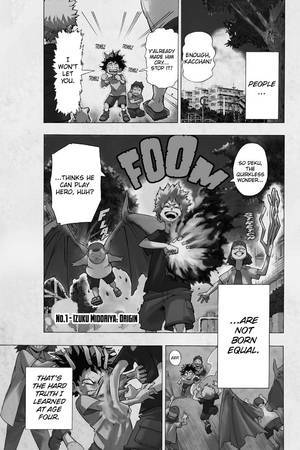
When Deku meets all might, and demonstrates his innate and pure heroism when he runs to save Bakugo from the sludge villain, he is offered a once an a lifetime chance: One For All. He is told that he can become a hero, and is aided in training to use the quirk and get into UA. By this point, Izuku’s self esteem issues that stemmed from his childhood and the the perception of quirklessness that was placed upon him by the world around him have only grown. He wants to be a hero, but he also has become quiet and reserved, as he thinks of himself more as an afterthought. He wants to help people, because he cares and he is a kind hearted individual, but also because he want to be useful. He has to be a useful hero, but how? The quirk of One For All thus represents a way to be useful in the way that Izuku thinks is correct, which is by being a quirked individual. So what happens when you give a kid with extreme self esteem issues, and who views himself as flawed for simply being himself, a very powerful quirk along side the opportunity to become a hero? That child latched onto the quirk like a lifeline. They have to make good use of their new quirk; they have to utilize the blessing granted to them or else they will remain useless and will be left behind. Izuku will work hard to earn his quirk because he feels as though he is unworthy, even though he already proved himself the second that his body moved on its own. Therefore, the second Izuku is given his quirk, he begins the cycle of using it as an unhealthy coping mechanism and source of validation. He is more hopeful than ever when given the quirk, but his unhealthy mindset is also given the power to run rampant. This is the story of a boy becoming the greatest hero he says, so early on in the series, but it also of a boy desperately trying to become more than he currently is, for better and for worse.
This then leads to the beginning of his time at UA, where Izuku, in addition to clinging onto his quirk as a replacement for his self esteem, begins reclaiming the meaning of his nickname Deku. “Deku is the name of a hero” he declares, and while taking back the power from his former bully and standing up for himself is an incredibly uplifting moment or Izuku in the beginning of the manga, there is another side of the coin that is the reclamation of Deku. Izuku Midoriya feels as though he has to be the new, hero Deku, or else there is nothing else worthwhile about him. He has to prove himself as a true hero or else he’ll have to go back to the old, useless Deku…He’ll forever be left behind. So, he breaks himself. Over, and over, and over again. The hero named Deku breaks his limbs time and time again, because if he doesn’t push himself to the brink, then he hasn’t done enough, and therefore he has failed the quirk that he was blessed with and failed the people who have helped him.
The sentiment that he needs to hurt himself, or even nearly get himself killed, is incredibly concerning and could even be seen as suicidal ideology. Furthermore, this ideology creates an intense fear that follows Izuku wherever he goes, and even causes him to blame himself in scenarios where it’s not his fault at all, such as the summer camp arc where he was nearly killed by muscular, yet still beats himself up over Bakugo’s capture.
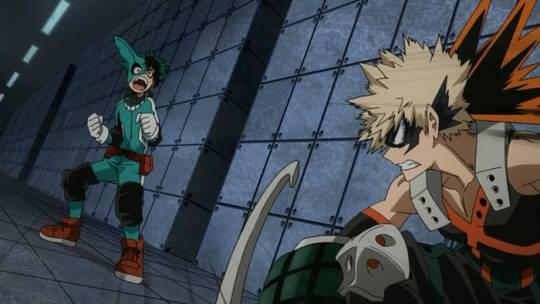
Another development that occurs at the beginning of Izuku’s time at UA is the start of an insurmountable amount of pressure being placed on his shoulders. When Izuku first received One For All, he was told that he could use the quirk to achieve his dreams of being a hero. He knew nothing of its past, and was given no indication that he had to live up to it. Yet, during the tournament arc Allmight begins mentioning the idea of Izuku becoming the next symbol of peace. While an honor to have, being the number one hero and an international symbol was not what Izuku, a fourteen year old kid at the time of the sludge villian attack, signed up for. Yet, he takes on the responsibility with a nervous smile on his face, and the shadow of all might begins following him. Next, he learned about the horrifying figure that is All For One, and Izuku is told that he may have to fight him one day; He may have to fight someone that he had previously thought to be nothing more than an urban legend. The child who wanted to become a hero now has to be prepared to fight the demon lord. Moreover, these revelations begin the process of Izuku placing more and more pressure on himself to be the best hero possible. He cannot afford to make a mistake. He cannot afford to be useless, because the legacy of One For All demands that he be exceptional. Afterall, he’s the ninth user. Do the wants of Izuku Midoriya really matter more than the fate of the world?
During all of this, Izuku slowly becomes more comfortable with his quirk, and grows in confidence. He truly becomes equals with Bakugo and works with him to mend their relationship, and he also develops his shoot style in an effort to move away from imitating All might. These things are all possible development for Izuku’s character and also gradually take place as the series goes on. After so many years of being quiet, he finally opens himself up again; He opens himself up to love from his peers, and opens himself up to new experiences. He also becomes more willing to talk back to others, as demonstrated by his attitude towards Endeavor, and later his more frequent and friendly banter with Bakugo. However, the self esteem issues and insecurities never go away, and Deku still breaks himself every chance he gets. The pressure also still continues to build as Allmight retires, and Izuku becomes truly trapped in his role as the successor. He accepts his role, and is happy to be serving others, but Allmight’s retirement leaves a void that Izuku feels as though there is no one else left to fill but himself. There’s no backing out now, and Izuku’s quirk development now has to speed up or else he will never be able to fill that void. He also witnesses the might of All For One in person, and the nightmare of him having to face the demon lord becomes even more of a reality. Through all of this, Izuku still refuses to talk about his feelings with his peers or the adults around him, and instead he decides to keep marching forward without taking any time to let himself, or his mind, rest. The only sliver of hope for Izuku’s mental well-being is the fact that he still allows himself to cry. Therefore, the shadow of responsibility that followed Izuku morphs into a massive weight on his shoulders that helps to steer his development backwards and into character regression.
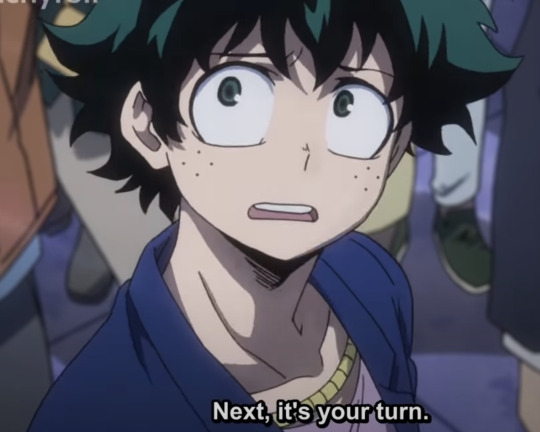
Izuku’s mental health then takes a turn for the worst after the Overhaul arc, which was also a turning point for the series with its dark tone. As Izuku sees for himself the real horrors of the criminal underground, he once again blames himself for Eri’s circumstances and his inability to save someone. Through this experience, Izuku becomes so entrenched in the idea of becoming the perfect hero that he even begins denying himself the right to cry. He says that “heroes don’t cry”, and other characters such as Todoroki are shocked at the statement by their friend. Crying was one of Deku’s last healthy coping mechanisms, and he loses that too. Nighteye’s death cements this fact, as it is actually the last time that Deku sincerely cries in series, before the end of vigilante arc. All other times that he cries moving forward form this point are played off as gags, and thus Izuku represses his emotions to an extent that is even foreign to him, as someone who has been suppressing his emotions since he was a small child. It should also be noted that this arc highlight’s Deku’s uncertainty as a holder of One For All. This shows that no matter how much Deku’s confidence improves, he will continuously view himself as not good enough and fear the return of the former “useless” Deku. In addition, the overhaul arc also highlights Izuku’s loss of innocence. As I said before, Izuku is exposed to the true cruelties & horrors of the villian underground, but this development is not new. Dating back to the Stain arc, Izuku has been gradually losing more and more of his innocence. Even when he endured a very difficult childhood, Deku was at least able to told onto hope and be optimistic for the future, but being thrusted into the world of heroes takes the bright eyes boy and chips away at his soul. He keeps going, because as always he refuses to give himself time to heal, but the Izuku at the end of the Overhaul arc is not the same person as we was when he first enrolled in UA, and he never will be again. The fear, responsibility, and loss of innocence all culminate to send the mental health of Izuku Midoriya into a free fall, but he would never admit it. Instead, he keeps on smiling.
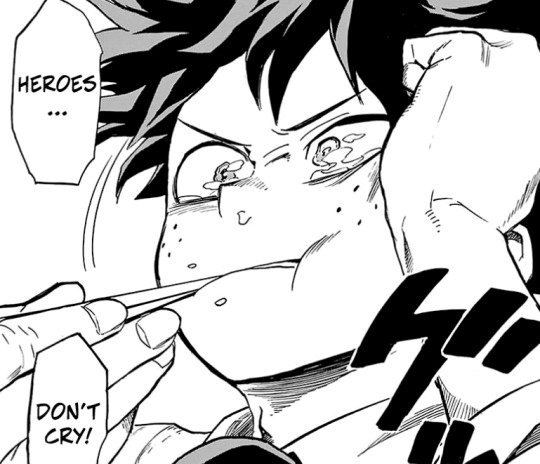
We are getting close to the vigilante arc (I hope you’ve been enjoying this so far!), but one final significant development in Izuku’s mental state occurs during the Class 1-A and Class 2-A training session, where he is once again given responsibilities that he never asked for. At this point, Izuku’s confidence has grown exponentially, but on further inspection much of that confidence seems to be misplaced. You see, while Izuku becomes extremely confident in his use of One For All, he still remains insecure about himself as an individual. He still lives in fear of being useless, and constantly needs to prove himself. This is because Izuku Midoriya the individual is being slowly left behind, while the Deku the hero becomes comfortable with his quirk because if he can’t master his quirk then he has nothing. He is nothing… Then Blackwhip appears, and Izuku has to relearn his quirk even though he had already been working fro months to get to to the place he’s currently at. It feels like a slap to the face, but now that Izuku has now more formally met the vestiges, he’s given no choice but to accept his new quirks in addition to his role in “completing One For All,” as The 1st user puts it. Izuku Midoriya fades even more, the incredible amount of responsibility grows even more, and the hero Deku sees himself as nothing else but the ninth holder. Most of this understanding of Izuku’s mental state is not actually spoken of out loud in the manga/anime, but the context clues of the events leading up to this moment (as shown by all the writing before this), Izuku’s facial expressions, and the events afterward help strip away the smile that Izuku is so determined to keep on his face almost the entire arc and show high Izuku’s walls have grown around his internal anguish. Therefore, the metaphorical vault shown that Izuku uses to lock away his quirks is also used to lock away his emotions once and for all. The only leak in this facade that we have until the end of the vigilante arc is…
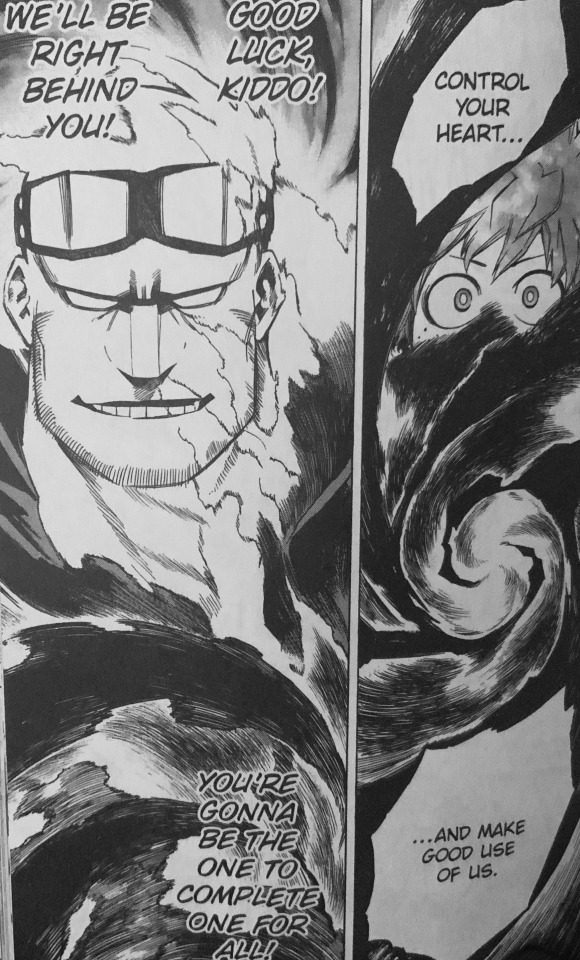
Izuku’s character regression has already been set in stone by the time the war arc comes around, but what is important to note is how his repressed emotions manifest in the form of his intense rage. We’ve seen this before, with how Izuku becomes incredibly intimidating and unhinged during his fights with villains such as Muscular and Stain. All For One’s theme even plays in the anime as Izuku fights Overhaul to represent how monstrous he is int eh eyes of villains during battle. The difference during this arc is that other characters are finally catching on to just how toxic Izuku’s ideology has become. Bakugo in particular takes takes note of just how not ok it is for Izuku to not take himself into account, and shows visible concern while Izuku fights with Shigaraki in the air. Not only is Izuku being destructive to himself, but he also lashes out so harshly that is seems though he intends to kill Shigaraki in the moment. But to Izuku, he has no other choice. He is Deku, a hero, and the Deku who always does his best. Deku himself veery clearly states during this arc that he will no longer be the useless deku, and with that statement he resolves to kill the remnants of Izuku Midoriya, the quirkiness kid with bright eyes, himself. He cannot afford to be useless. He refuses. He will kill himself during this fight with Shigaraki if that’s what it takes to be a hero who saves everyone and a hero who is worthy of being the ninth holder of one for all. Finally, everything has come full circle, and the name Deku starts as something negative, then is given hope to become something positive, but then once again becomes a toxic image within Izuku’s life. That is why it is so important when Izuku is called by his first name in the vigilante arc— because Izuku Midoriya, both the quirkiness child and the current person, are deserving of love and have value beyond their quirk. Izuku is more than One For All, but unfortunately all of his repressed emotions that have been highlighted throughout this entire analysis have to explode out of him in order for him to heal. In addition, Deku and the repression of his emotions has led him to push everyone else away, even back when he was smiling nonstop. The war arc simply showcases ho bad that seclusion has gotten, and that when it comes down to it Deku will purposely exclude his peers in order to suffer alone.
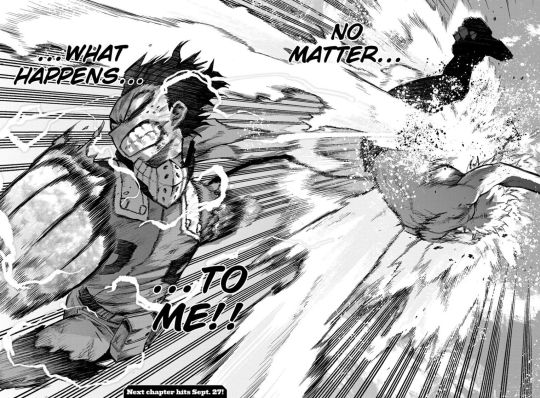
Izuku, in the vigilante arc, will simply be the ninth holder of One For All, whose only purpose and value lies in defeating All For One himself. Furthermore, at the center of this entire discussion, is the fact that Izuku is afraid of his past. All of his self esteem issues come from such a young age, and yet he does not know what else to do besides run from it. Izuku Midoriya is a character that is so defined by his past, yet is so desperate to escape it. Therefore, he will need to be reminded by his loved ones that the cycle of trauma that he has endured throughout his life does not have to continue. He can choose his own way. He is not shackled by his past, and thus healing is possible. It’s not too late, and all he needs is his friends to remind him of why he is loved for his heart, and not his quirk. Therefore there is no singular character that got through to Deku. All of 1-A saved the boy who was so desperate to save anyone but himself.
With that said…
Deku’s entire arc throughout the series leading up to the vigilante arc has been filled with regression, in the sense that the heros around him place more and more pressure on him to the point that he does not consider himself human, but rather a tool that has no value outside of One For All. This is the story of a boy that becomes the greatest hero, but also of a boy that was stripped of his innocence and beaten down by a system that rejected him since the beginning, yet he still dreamed of being a part of. The entire vigilante/villain hunt arc brings together all of the pent up pain and self-loathing that has been following him since the beginning of the series, and shows how everything that he’s been hiding has finally caught up to him. The pain and trauma that we see from Izuku in this arc was always there, and all it took was the war arc to trigger it to come forward.
In conclusion, Izuku Midoriya is an extremely complicated character who has been on a fascinating downward spiral since the beginning of the series, and if readers can take the time to see how he got to where he is, then maybe we can at least better understand the context behind the vigilante/villain hunt arc, and the complexity behind My Hero Academia’s protagonist.
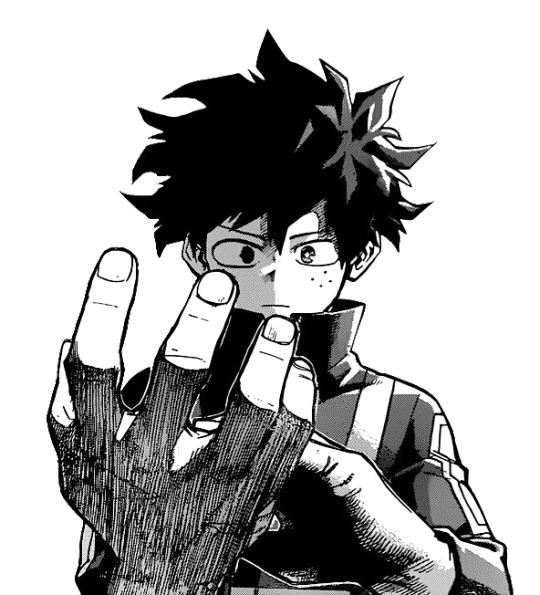
Credit to @mettywiththenotes for having the post that inspired this essay, and that I originally had the conclusion of this analysis posted under as a reblog. Also credit to @pikahlua’s mha discord server that I’m in for encouraging me to write this!!!
#I hope people enjoy reading this as much as I enjoyed writing this#All of these thoughts have been floating around my head for YEARS (starting way before the vigilante arc) so I’m happy to get it all out#I care about this a character a lot and I think that he’s worth a least taking a little deeper look into and understanding#izuku midoriya#midoriya izuku#deku#bnha deku#bnha#mha#boku no hero academia#my hero academia#bnha spoilers#for now at least until the premier of the arc#analysis#bnha analysis#bnha meta#Mha meta#Let me know what you guys think cus I’m fascinated to see how people have developed their opinion of deku#whatever that opinion may be#Hope speaks#Lets make that a tag cus why not#Class 1a#They are the key to Izuku’s healing
321 notes
·
View notes
Text

happy birthday miyu!!!! (im sorry i almost forgot, i got distracted!)
#crow's scribbles#d4dj#d4dj groovy mix#miyu sakurada#haruna kasuga#miiko takeshita#kurumi shiratori#harumiyu#HAPPY BIRTH!!!!!!!!!!!!!!!!!!!#i got distracted w the analysis i almost forgot to post miyu!!! im sorry!!!!#theyre on a date btw. (both of them dont know--)#haruna is trying to do what she learned from aoi but she's failing and also succeeding????#she lent miyu her jacket so she managed to do something....#kurumi and miiko were inspired by the muses and cherubs. i hope you enjoy them <3#the flower haruna's putting in miyu's hair is a white margaret (which is a white daisy. marguerite is its french name)#all u harumiyu fans know what that means <3#waughghgh im sorry i didnt do something. like. rlly cool and swag w miyu like what i did w yuka but i think this drawing is fine!!#anyway. happy semi belated birthday miyu!!!!!!!!
44 notes
·
View notes
Text
How Postal 1 is a playable Tragedy and how Postal 2 followed with a Comedy after it. - A semi formal essay about the narrative and story beats of the beginning of Postal
That's right! This was not an april fool's joke! The only april fool here is me! It's an idea ive been brewing on for a while and it's probably very rambly, but such is life, i hope you enjoy it regardless <3
Before I begin this essay, I would like to clarify a few things.
One, I want to address right away that while I do try to be critical and non-biased on these sorts of discussions, due to my own personal attachments to specifically Postal 1 Dude, I don't think I will ever be able to make a fully unbiased view of him. Again, I will try my best to, but I hope pointing it out here will make it so you can decide if that’s something you’re okay with.
Secondly, while i will try to reign myself back a little and not just spew words at you here, i do tend to ramble a little and have trouble connecting points to other points, so if i do please forgive me there. This is meant to be a semi-formal essay, but still I am not a professional writer. Additionally, while i do this analysis of this series, i do not think it is what the creators intended, please do not take this as full canon and all. This is simply for fun and to recollect on the first two games of the series.
I hope you will understand, and with those disclaimers out of the way, we can begin with the essay.

We begin this essay with Postal (Which I will be calling Postal 1 for the sake of clarity, by the way), a PC-Rom game released in 1997 by the company Running With Scissors, originally published by Take Two Interactive before publishing moved over to Ripcord Interactive. The game was marketed to be intentionally provoking and intense. One example is through fictional interview quotes talking about how he seemed to be fine before the events of the game with a simple question below.

What went wrong?
With little more than that, a picture of an M-16, an invitation to find out at their website below, and a short talk about how to get the demo, it leaves a striking impression on the viewer and a burning curiosity to find out what did go wrong. Other advertisements for the game are similar in nature, being very eye-catching and intense to draw in the reader to want to see more.
Described by the studio as “The game every gamer wanted and no one else dared to make”, it’s very clear their intention was to bring you in with its more intense subject matter as this game that dared to go where no game had before, to either acclaim or great critical disgust. It is described by the promotional material as a psychological thriller, preparing the incoming viewer for the expectation this game would be intense.
From the advertisements though you can already get the idea there may be something else to this game, introducing Paradise as a town where everyone is out to get you (or are they?), and that whether it is Conspiracy or Insanity, you have no time to question, only to act. This narrative carries over to the game itself, as there is no formal introduction to a story given to the player unless they actively decide to read the manual included in the game’s case (or chose a higher difficulty in the remake, Postal Redux), you are more an outsider to what happens after you press play guiding the Dude through this hell.
However, I think to truly enjoy Postal 1, it is important to consider the journals themselves to get the inner perspective of your player character. Those who do not choose to may take the game at a more surface level with the “dark” cutscene texts and gorey gameplay then simply leave it behind, but the hidden story adds a whole extra level of depth and truly establishes Postal 1 as a tragedy.
To explain where I am coming from at that point, I would like to establish what makes a tragedy, specifically with Postal 1 being a Domestic Tragedy. (A tragedy in which the characters are middle-class or working-class people instead of nobility or rich people)
Aristotle’s tragic plot structure starts at the beginning, goes through action, leads to the realization of error, then goes through the falling action and emotional impact of it, eventually releasing the emotions of pity and fear through to the catharsis as the story ends and fear is removed.
While the game does not give much of an actual explanation of what happened in the Dude’s life before the events on October 17th, 1997 even in the diary entries that show his viewpoint, it’s easy to infer there was a rise even before then that he was not doing well mentally. He describes a rising paranoia, belief that the people there are sick, how “I hear gunshots, screams after dark. Now the phone calls, sayin’ i’m being thrown outta this house. My house.”, constantly arming himself with a sidearm and kevlar vest preparing for the incoming perceived impact that he ultimately makes reality.
From there we have our beginning, the game’s levels acting as the actions through the story that lead him on this journey through Arizona. Though initially he tries to find help and contact a sheriff, because he is seemingly so far gone, those efforts are in vain and his belief that everyone else is infected is reinforced. It separates him further from the people around him, believing that he is the only one who can save them from this sickness and that though the journey is bloody, it is for the good of mankind.
It’s likely at the beginning he intends to save them, but after a while, comes to the conclusion that the area is simply beyond saving, and that he needs to leave a scorched earth behind so he can warn those outside. His condition worsens the further the player goes, covered in blood, bullet wounds, body aching but unable to stop until he sees this desired resolution. As quoted from The Industrial Complex journal, “Too far to quit now. Whatever waits at the Base, I’m going to see it with my own eyes.” and from the Air Force Base as he tries to resolve himself to finish what he set out on, “Me or them. Can’t delay, can’t risk infection.”
Notably in the game’s manual there was no journal given for the ending cutscene in the original game, though I think the one for Redux is also fitting. “I’ve been here before. I know it. But… Something’s changed. Will they understand me? Forgive me? Is this where I find salvation?” One of the main things you’ll probably hear about relating to the differences of Postal 1 and Redux is the ending being changed.
In Postal 1, the game ends with the Dude making his way to an elementary school in a haze, the player no longer in control as he desperately tries to take aim at them, but nothing he does seems to affect them. Considering unfortunate tragedies in real life, this ending was changed for Redux, where instead the Dude walks up to the end of a church, watching as a coffin is lowered into the ground either alone on Easy to Medium or with two mourners on Hard to Nightmare, and the hostile count goes down from one to none as soon as it’s in the ground.
Either way, it ends with the Dude collapsing down to the floor, and the game finally ends with pictures of Dude in a hellish confinement and a voice speaking over top. The final speech talks about the stress of modern life before further mentioning how he had perceived himself as a hero against impossible odds, but in reality will now only ever be seen as a mad man who hurt hundreds, if not thousands of lives.
Some may say this ending is an anti-climax or a bad reward for the game, but i think through the lens of a tragedy, it is a perfect ending. Our ‘hero” through the entire game has kept himself standing because he thought he was doing the right thing, that his actions were horrible, but it would be justified by the good he was doing. He does not want them to writhe and suffer, the journey is a horrific nightmare, and there is no sense of pride or that he’s finally getting some kind of vengeance on those who wronged him. But he persists, he moves onwards because he so desperately wants to end this and stop the madness, one that only he sees as reality.
That is where we get the action, right after the Air Base is the Recognition, the point of realization that it was all for naught. In Postal 1, it’s likely this comes at the moment he realizes that he’s not doing anything to them, and unable to simply destroy this ‘threat’, he is forced to stop and think if he’s even been going against any threats at all. How far has he gone to the point he was going to harm innocent children? How many more innocents has he harmed? With Redux that realization is more up to interpretation, whether the casket is where he’s in after he dies and realizes that there’s no recognition of him after his death, or if it’s the last hostile he has to kill, only to realize even with them dead, the world around him has not gotten any better, only worse because of his actions.
The pity and fear comes from the moment inside the cutscenes, and from there the "catharsis", when he is ultimately institutionalized with no seen trial, no fanfare, and is given an analytical view from an off-screen doctor before the game ultimately ends. And again, I think for the game that Postal 1 is, it’s the perfect ending. Because truthfully, was there ever going to be any good ending for him after his collapse? The player either knows or discovers along with him that his journey was for nothing, he killed countless people including potentially civilians who had just happened to get caught in the crossfire, and the grand threat he fought against did not even exist. There are no heroes, there is no triumph, it was all for nothing, and now he is confined to a cell as several hundreds of families have to cope with the loss.
With all of this, I think Postal 1 Dude (and subsequently Postal Redux Dude) is a great tragic “hero” figure, as deep down he wants to do good for the world. If you take the advertisement interviews and hints from others as a sort of semi-canon, it’s implied he was doing good, he was kind to others and liked well enough, but likely due to an untreated and ignored illness began to fall in on himself into a paranoia so deep he could never crawl out. I hear a lot of the notion that he “snaps out of nowhere”, and that he’s just “crazy”, but I think that’s a gross oversimplification of his character.
Even in the moment of it all, he initially tried to go to a higher authority for help but found himself all alone to try and stop this ‘sickness’. His journey is his own personal burden, taken to try and stop anyone from being hurt, at the cost of his health and potentially his own life. But it’s also important to not just consider his intent, but the action caused afterwards.
Because while he did mean to save others, he still hurt hundreds of people. There are hundreds of families who will never see their partners, their siblings, their children, their friends, all because of one overzealous man who decided he was going to be humanity’s savior. Perhaps it is not just conspiracy or insanity, but instead the poor judgement of a man who truly believes he is doing right being guided along by an outside force who makes him see it through to the end.
In Postal 1, you are the audience to a grand scale tragedy, bringing a man on a journey through hell to a shallow grave where no one is saved, no one is cured, leaving you back on the title screen to think about what you’ve done to him and the people of Paradise.
In Postal 2 you can smoke crack and piss on people.
Okay, sorry for the whiplash, but I had to transition somehow.
After the release of Postal 1 and subsequent expansions, there was obviously a backlash as well as critical acclaim. The game was banned in several countries, Running With Scissors was personally given a letter by the USPS about the name, and it was pulled off the shelves of several stores. Many books about video game violence and newspapers talked about the game and admittedly got quite a lot about it wrong, like believing the Dude was an ex-postal service worker despite the game never saying so, that there was some sort of score based system for “killing as many innocent victims as possible while they begged for mercy” (Stop Teaching Our Kids To Kill, Lt. Col. Dave Grossman and Gloria DeGaetano, Chapter Two, 1990s: Video Game Violence Increases.), not to mention how many were quick to try and pull a connection between it and horrific tragedies in real life.
(Quick unprofessional note, the amount of times i saw this one damn quote about a specific killer killing himself “JUST LIKE HOW YOU END LEVELS IN POSTAL!1!” despite that NOT being how you end levels in postal or even the game makes my head physically hurt.)
With this reception of Postal 1, it does make sense for Running With Scissors to decide to take a change of focus when they began work on Postal 2 after the cancellation of their next game, Flesh and Wire. While Postal 1 was more intense in tone and serious, Postal 2 was set to be much more parody focused and had a drastic shift in the appearance of the main character.

While Postal 1 Dude in the concept art and promotional image notably looked disheveled and scared, Postal 2 Dude felt more laid back, engaged in the chaos around him and able to dish it back just as hard. There’s a very noticeable shift even before the game came out, from a man huddled in the corner with a rifle or seemingly startled holding an M-16 (note, i'm pretty sure it is? I am not a gun person, sorry </3) to a man standing with his body facing the player, brandishing his rifle as chaos ensues behind him.
The town of Paradise goes through a similarly drastic change, from a somewhat toned down and realistic feeling environment made of cool and dark colors to a much more exaggerated parody of a small town in Arizona full of bright, warm colors. The game begins with a sweeping view of the town, passing by a road sign warning to “watch for psycho assholes”, a drunk man dancing in the streets as a cat falls asleep, a man is beat by a police officer, and the player can already see several satirical billboards on their way to Dude’s trailer.
The introduction to him is also drastically different, now speaking directly as he wakes up in his obviously run down trailer and gets into an argument with his wife about moving to Arizona to pay for his crack habit, the AC being broken (which he obviously doesn't make better by shooting at it), about chores until he makes his way out of the trailer and kicks away Champ, his car not working, and the Bitch reminding him to get her rocky road. This immediately sets up Dude in this game being much more cynical and snarky, someone who’s been chewed up and spit up by life, and now is dealing with a pretty rough morning.
The game itself follows a pretty similar tone, gone are the unsettling journals, the morality of it all, in this remodel of the series the game has effectively gone from Tragedy to Comedy. More specifically, I think Postal 2 falls under a Farce, which according to the Wordsmyth dictionary, is “a comedy that depends for its humor on quick and surprising turns of events and on exaggerated characters and situations, or the type of humor characteristic of such a play.”, which I feel is very fitting. Running With Scissors put more emphasis on physical comedy, slapstick yet still grotesque violence, bodily function humor, and of course, a lot of satire and parody of life at the time.
The game itself plays as if it were a comedy, each day functioning as a new act as the chores act as the separate jokes, returning jokes such as the Dude’s relationship with his wife and introducing new ones such as the incredibly zealous anti-book protestors burning down a library on Tuesday or the cannibalistic butchers of Thursday. The main sources of these jokes in the game come from two factors, that being the world around Postal Dude is insane and absurd but he still has to make it through each day somehow, and an extreme form of Murphy’s Law, in which anything that could go wrong will, and at the worst possible time.
The ability to make it through these insane events in one piece is what mainly separates Postal 2 Dude from Postal 1 Dude, as while Postal 1 Dude holds onto his sense of justice and morality in the horror he saw and ultimately ended up hurting himself and those around him, Postal 2 Dude is adaptable, able to keep his head above water and make it home despite it all. The game’s increase in the story’s conflict as each hate group begins to target Dude is still joking in nature, just another group of people who hate him and try to kill him on sight, but you’ve got errands to do so you just gotta deal with it.
The ultimate climax of this increasing rise of stakes leads to the final event of Friday, quite literally a full blown apocalypse (complete with a nod to Postal 1 on the newspaper about mind altering gasses and the military being involved) where cats and dogs rain from the sky and everyone and anyone is trying to kill each other, especially you.
It’s the final big obstacle as you book it back home, this massive hysteria that serves as the big crazy finale until you finally make it home and things shift back to a mundane that now becomes comedic in its own right. Dude returns home, having made it through figurative hell only to be reminded of a joke that comes full circle from the start, the fact he forgot the Rocky Road. The final joke ends with a loud gunshot, implying that while he could make it through all he’s been through that week, having to be there even a moment more made him decide he’d rather spend the night in a hospital or a grave.
In conclusion, the drastic difference between Postal 1 and Postal 2 is incredibly fascinating to me, especially through the lens of them as a traditional Tragedy and Comedy in video game format. While the series has leaned much more to comedy after the release of 2 and Redux did not do as well financially, i think it’s still interesting to look back at the beginning of the series and their adaptation of it later on to see how the Dude began.
From a desperate and hopeful but ultimately misguided self imposed martyr of humanity who was going to drag along as many as he needed to “save” those outside to a cynical and sarcastic man living in a trailer home making it through each progressively more crazy day to make it home and start a new day after that, you can fully feel the shift in tone from the soundtrack to the design to the gameplay of the games itself.
I do think it was probably for the best that Postal had turned more comedic as time went on, it seems to be more where Running With Scissors are able to fit their writing, however i still look back at Postal 1 very fondly and hope to see more of those tragedy elements come back for a bit in the jokes. It’s a compelling narrative and even if they say it has no story, i’ll always think the story it DOES have is very underrated.
Here’s to hoping for that Postal 4 weekend expansion?
#postal dude#postal 1#postal 2#character analysis#i included some drawings inbetween to break it up a little so its not all just words#i hope p2 looks okay i dont draw him as much as i do p1-#again i hope you all enjoy this ive been thinking about it very much#Postal 1 you may have no story according to others but you have all the story according to me <3
100 notes
·
View notes
Text
A little analysis of this part in the Odyssey:
Reading time: ~10 minutes
Book 23, The Great Rooted Bed, Fagles' tr-n
There he sat, leaning against the great central column,
eyes fixed on the ground, waiting, poised for whatever words
his hardy wife might say when she caught sight of him.
A long while she sat in silence … numbing wonder
filled her heart as her eyes explored his face.
One moment he seemed … Odysseus, to the life—
the next, no, he was not the man she knew,
a huddled mass of rags was all she saw.
“Oh mother,” Telemachus reproached her,
“cruel mother, you with your hard heart!
Why do you spurn my father so—why don’t you
sit beside him, engage him, ask him questions?
What other wife could have a spirit so unbending? Holding back from her husband, home at last for her
after bearing twenty years of brutal struggle—
your heart was always harder than a rock!”
“My child,”
Penelope, well-aware, explained, “I’m stunned with wonder,
powerless. Cannot speak to him, ask him questions,
look him in the eyes … But if he is truly
Odysseus, home at last, make no mistake:
we two will know each other, even better—
we two have secret signs,
known to us both but hidden from the world.”
Odysseus, long-enduring, broke into a smile
and turned to his son with pointed, winging words:
“Leave your mother here in the hall to test me
as she will. She soon will know me better.
Now because I am filthy, wear such grimy rags,
she spurns me—your mother still can’t bring herself
to believe I am her husband.<...>
Telemachus is a precious baby, we've established that.
But he does act a bit like a brat with Penelope a couple times. Of course I don't think that any of that is malicious or that he doesn't love her, but he's still being a bit of a brat.
They both suffered, their pain was similar, but also very different, their experiences and the way they processed it were different as well.
Moreover, at this moment Telemachus has already spent some time with Odysseus. They already had their meeting/reunion and they already cried it out (to an extent. I'm sure there's more crying they'll do afterwards). They even had a father-son bonding activity (a.k.a. the slaughter of the suitors). Telemachus got to know his father at least a little bit over the past couple of days and at this point he processed and accepted the idea of Odysseus being back.
Penelope, on the other hand, was told about it just a moment ago. She can't immediately go "oh, you're saying Odysseus is back? Wonderful, let me greet him", no. Odysseus wasn't away on a short hunting trip or something, he was away for two whole decades, half of that time he was pretty much thought to be dead by most people (the first half wasn't that much better, as he could've still died any time during the war, but at least he wasn't lost, Penelope knew where he was).
Now she needs time to wrap her head around what is happening. We even see her thoughts as she goes to meet Odysseus:
Penelope started down from her lofty room, her heart
in turmoil, torn … should she keep her distance,
probe her husband? Or rush up to the man at once
and kiss his head and cling to both his hands?
She wants to reunite with him, she wants this to be true, but she can't be sure of anything now. They have been apar for longer than they knew each other. Does he still love her like he used to? Is he the man she loved? Is it even the real Odysseus in the first place? She needs to process everything, as well as confirm all the information herself, and Telemachus, at least at this moment, doesn't comprehend that. He's acting quite immature, scolding his mother for not immediately believing and accepting that Odysseus is back.
This is a very interesting detail. First it once again shows us that Telemachus still lacks a lot of maturity, despite having been on his coming of age trip. He's still very young.
Yes, he definitely grew a lot in that short time, but it would've been impossible for him to learn everything at once, he still has a lot of that immaturity left in him, there's still a lot of room to grow and that's completely understandable. We, as people, grow for our whole lives and Tele is doing remarkably well, especially considering his circumstances.
Another interesting thing about this part is that it shows Telemachus', perhaps a bit childish, impatience. He is a kid, who finally met his dad (and his biggest hero), he knows that his mother was suffering and grieving for pretty much his whole life (with things getting a lot worse over the past decade). From Telemachus' perspective Odysseus' return is supposed to solve all their problems, especially since their biggest problem, a.k.a. the suitors, was just taken care of and it wouldn't have happened without Odysseus.
Telemachus just wants a happy family. His dad is back and seems to love him, the suitors are gone, now his parents should reunite, his mother will stop grieving and everything will be perfect. This is something he dreamt of his whole life and it's finally so close, but his mother doesn't immediately believe him. She doesn't immediately accept Odysseus and Telemachus doesn't understand why. He is too preoccupied with wanting things finally to be okay, that he doesn't take time to think about what Penelope must be feeling. It doesn't even occur to him. Perhaps it's also partially the need to be believed and listened to, which is also something he lacked growing up around suitors and being treated as a child, but I'm not diving into that right now.
Odysseus, on the other hand, understands what's going on. He assures his son, that everything will be okay. He pretty much does a more adult version of "mom and dad will take care of this, you go play for a bit". Odysseus understands Penelope's reaction and goes from there. Of course he wants to be in her embrace as soon as possible, but considering everything she has been through, he definitely can't just suddenly grab her and do what he wants. This is his dearly beloved wife and he wants her to take on that role voluntarily, like she did before, he wants her to accept him as her dear husband, like she did before, and for that he has to let her do it at her own pace. He tries to meet her where she's at, to do this reunion on her terms, to assure her, that he is, who he says he is and who others tell her he is.
This is just so amazing and I love their relationship so much (T▿T)♡
I also love Penelope's reaction to Telemachus' words. She doesn't react negatively, she is remarkably calm and part of it is probably the shock from what's happening, but still, she is "well-aware". I think that she knows Telemachus really well, because even though he has surprised her with how much he matured, he's still the same boy, he's still her kid. She most likely understands where Telemachus' outburst is coming from and doesn't get angry, doesn't scold him for his impatience, she reassures him. She lets him know, that he doesn't need to be scared of things falling apart and that she isn't looking to reject Odysseus. She's looking for Odysseus and she hopes she can find him in that familiar and strange man before her. She just needs time, but she will be taking the effort to search for what she's looking for, now that she has a way (she wouldn't have been able to go searching for Odysseus at sea, but now he's, supposedly, right here and she will handle it like the queen that she is).
#the odyssey#this is just my interpretation of this scene#you're completely free to interpret it differently#I wrote this analysis a while ago and now decided to share it here#hope you enjoyed#odysseus#telemachus#penelope#they all care about each other so much and they've been through a lot#just give this family all the happiness#please TT#tagamemnon#greek mythology#the “reading time” mentioned above is how long it took me personally to read this whole post properly#I just find time estimates like this helpful when I'm about to read something long#obviously not everyone's time would be the same#someone might read slower. others might read faster and that's okay#I just thought this might be helpful to someone like it usually is to me#certainly no harm in putting it here)))#odyssey rant
48 notes
·
View notes
Text
Analyzing Nick Dear's Frankenstein (and why we should move on to better play adaptations)
Alrighty y'all, its the long-awaited Nick Dear Frankenstein analysis post! This post is focusing specifically on Dear's characterization of the Creature, and why it negatively affects the play overall (plus some adaption theory added in for funsies). For additional context, I am an MFA candidate studying theatre, and I did this research and the accompanying slides for a project in my graduate-level theatrical criticism class. Basically this post is the text version of that presentation, with some of the slides included, and the fluff trimmed. There is a fair bit of academic jargon in here, but I tried to make it as accessible as possible!
And with all of that out of the way, the Nick Dear Frankenstein deep dive is under the cut! (And citations at the end.)
CW: Discussions of violence and SA.
Before I get into the script itself (which if you are interested in reading it, a PDF version is easily found on google), I want to introduce a fun adaptation theory which is specific to studying Frankenstein, called "Frankenstein Complex Theory." This theory comes from Dennis R. Cutchins and Dennis R. Perry in the introduction section to "Adapting Frankenstein: The Monster's Eternal Lives in Popular Culture." (A fantastic read that I recommend to anyone if your school or local library has it in circulation.) This introduction introduces the "complex" theory, as well as some really awesome ideas that get used and referenced by all of the authors included in the book.
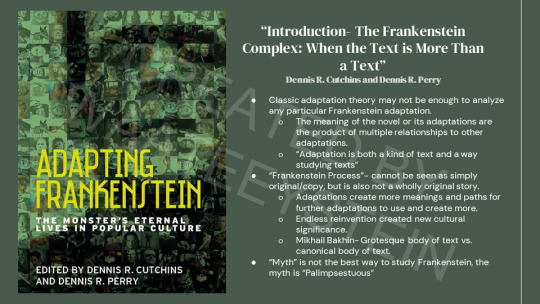
Basically Cutchins and Perry assert that traditional adaptation theory is simple not enough to properly study Frankenstein and it's innumerable adaptations. One might also assert that Frankenstein itself is an adaptation, Mary Shelley published multiple editions of her story, and one could argue that the original story is an adaptation of other stories like "Paradise Lost." Linda Hutcheon, another academic in the field of adaptation studies who also wrote a fantastic book (cited at the end), talks about this idea of "palimpsestuous Intertextuality." I want to first argue here that the original text of Frankenstein and its adaptations (the "myth" of Frankenstein) are palimpsestuous.
And when I say the "myth" of Frankenstein is "palimpsestuous," its basically just saying that the "myth" (tall green guy with bolts in his neck who is mostly non-verbal, going around killing people mostly without rhyme or reason) is the predominate cultural narrative of Frankenstein's monster, rather than how he actually is in the book. All of the cultural ideas of what Frankenstein's monster is are this giant network which interweaves with itself, references and builds off itself, and constantly creates new things from these connections. The book and it's adaptations are not in hierarchy, one is not implicitly better or more important than another, they all work together to create our cultural narrative of Frankenstein's monster. Thus, palimpsestuous Intertextuality.
But what is this "Complex" theory I mentioned earlier, and what does it have to do with Nick Dear? Well, here is a helpful diagram!
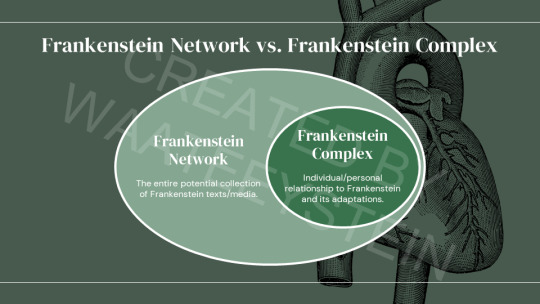
Essentially, every piece of Frankenstein media every created, including Mary Shelley's original novel, are all part of the "Frankenstein Network." The complex, however, is personal, it includes anything from that network that you have personally consumed. Some people have a wider complex than others, but nonetheless, most of us have some kind of Frankenstein Complex (if you're this far in the post I'm assuming you have one lol.) I think Cutchins and Perry really popped off when they created this theory, its a fantastic way of studying/teaching adaptation.
But onto Nick Dear. Why did I just spend so much time covering adaptation theory and teaching you all a bunch of academic jargon? Well firstly, I spent a lot of time on that research for class and I wanted to share. But secondly and more importantly, my thesis for this entire post is that Nick Dear, whose goal with his play was to create an adaptation which humanized the Creature and sticks very close to the novel, created something that was unintentionally more a product of his personal complex and the palimpsestuous "myth" of Frankenstein's monster. He wrote a play that deeply mischaracterizes the Creature, and in turn uses violence and SA for shock value rather than substance.
And maybe this is a bold claim, but I think comparing the plot of the novel (from the creature's point of view) and the plot of Dear's play is a good place to start. And for your visual reference, I created a plot diagram for both so that we can compare the two side-by-side. (Thanks Freytag lol.)
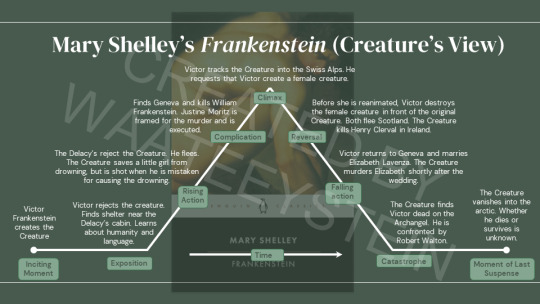
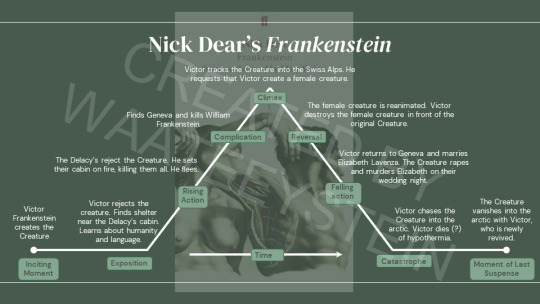
The first thing we can notice about comparing the overall plot structure is that they are indeed, very similar. And this tends to be most people's reactions to seeing this play. That compared to most other Frankenstein media, it is super faithful to the book in terms of setting and characters and hitting important plot points. And I too want to praise Dear for that. I think he was extremely smart about what characters he chose to cut or combine, and the plot points he chose to include. I also personally love that despite the cutting of Walton's character, Victor and the Creature still visit the arctic at the end of the play. Dear made so many great choices with his play, but ends up squandering it his mischaracterization of the Creature.
But how is he mischaracterizing the Creature? Well first, lets look at how Shelley characterizes him in the book, specifically in terms of violence. I argue, that anytime the Creature kills someone in the book, it is a mostly equal/proportionate reaction to the violence done against him. His first murder his killing William, and the subsequent execution of Justine after he frames her for William's murder. All of this comes after Victor's initial rejection of the Creature, and rejection by multiple villages, the DeLacey's and the young drowning girl and her father. Killing William and Justine was his first retribution after all of the rejection and violence against him, which was initiated by Victor creating him and rejecting him in the first place. And this is his only planned revenge at that point, his next move was demanding that Victor create a female creature for him, with the plan to flee and live a peaceful life in South America (whether he actually meant what he said is up to interpretation.) His next murders only come after Victor destroys the unfished female creature. This is when the Creature kills Henry and then Elizabeth. Elizabeth (and arguably Henry) are Victor's partners, and the people he most personally loves. Killing them is direct retribution for Victor destroying the female Creature, who was supposed to be (at least from the Creature's perspective) the Creature's romantic partner. All of the Creature's direct murders are direct mirrors to Victor's transgressions against the Creature. William is killed for the initial rejection and subsequent exiling from society, Henry and Elizabeth are killed for the destruction of his future romantic partner.
Dear takes a different approach in adapting these murders. In his play, the Creature's first murder is not William, but is actually the DeLacey's. After being personally tutored by Father DeLacey for a significant amount of time, the eventual and fated meeting with Felix and Agatha arrives and the creature is rejected by them. Instead of going straight to Geneva, as he does in the novel, he first sets fire to the DeLacey's cabin, killing the entire family inside. To me, this feels like the first instance of spectacle and shock over actual substance. In both Shelley's novel and Dear's play, as the creature learns about humanity and war, he clearly has a distaste for violence and killing. And because of this, I don't understand why the Creature has such an extreme reaction to the DeLacey's, especially in this version where Father DeLacey shows him so much direct kindness, and it is Felix and Agatha specifically who reject him. Why would the Creature decide to kill them all? If Dear wanted to add additional deaths, why not just kill Felix and Agatha and spare Father DeLacey because of his previous kindness? This violence, to me, feels undeserved and does not mirror the violence done against him by this family. From a staging perspective, the visual of the house burning is actually a very impressive collaboration between the set and lighting designers on the giant stage of the National Theatre. But I question why this moment needs to be here, when the rest of the play and it's staging in the premier production already has so much beauty and shock and spectacle. This is also the first moment where I find the Creature unsympathetic, because this action seems overly extreme as a response.
After this moment, the murder of William is different but not too dissimilar in tone to the novel. At it's heart, it is still the Creature's first direct revenge against Victor. After this, our next big departure from the novel is when the female creature is fully brought to life, different to the novel where she is never fully given life. Victor killing her after she has been able to briefly live is a more extreme measure on Victor's part too, which by my own argument, may warrant a more extreme reaction from the Creature. And to be absolutely clear, Victor simply kills/dismantles her, and nothing more. As for the creature's reaction, Henry is a cut character in this adaptation, so we obviously don't see his death. Instead, the Creature kills Elizabeth, but in this version, not only does the creature kill her, he also r*pes her. This is my biggest point of contention with the play. To me, the subtext in Dear's version is that the Creature views both Elizabeth and the Female Creature as some kind of property, and when his property (the female Creature) is taken away by Victor, he takes Victor's property (Elizabeth) away too. Right before her death in the play, the Creature and Elizabeth actually have a really touching conversation, and they seem to genuinely bond. And so when the Creature eventually kills her afterwards, him r*ping her comes completely out of left field. The only explanation to me, is that despite empathizing with her, the Creature ultimately still views her as Victor's property, and needed to take her away from Victor in a way that was more than just taking her life from him. And honestly, it's a really gross interpretation of these characters. And I want to be very clear that I know depiction is not endorsement, and that I also believe there is a time and a place for depicting SA on stage, but this play was not the time nor the place. The creature simply killing Elizabeth is enough to get the point across, the SA seems to have been added for pure shock value, and again, spectacle. One could argue that this action done by the creature is part of his sexual awakening, just as he learns about other aspects of humanity. But again I believe this is not justified by the text of the play, and is written for pure shock value at the expense of another character, specifically a woman. I would call this misogynistic.
And these extreme reactions from the Creature in Dear's play seem to create this hyper-masculinized version of the character and the story. And I think that is a shame considering the original story was written by a woman, and Mary Shelley did a fantastic job of writing a story where the men can exist across a spectrum of masculinity, without needing to be this stereotyped version of hypermasculinity with a desire for sexual vengeance. I mean, Victor creating the Creature is a pretty clear metaphor for motherhood/parenthood, especially considering Shelley's experience with motherhood and the loss of her children and her own mother. And not to say that a cis man isn't capable of writing an authentic adaptation of a woman's story, but here, I think Nick Dear missed the mark, especially in regards to Elizabeth's death and his depiction of Creature/masculinity.
And I don't want to boil this down to, "Nick Dear is a man and therefore his adaption is automatically bad." Because I don't think that's the case, and I think that's an unfair assumption to make. What I do think, is that despite trying to make an adaptation that strove to humanize the Creature better than most other adaptations, Dear instead created an adaptation that fell into the overly-violent monster tropes of the greater Frankenstein Network of adaptations. In essence, Dear may have unintentionally become a product of his own "complex." And unfortunately, that subconscious influence may be partially why we get this interpretation of the Creature, and the unnecessary shock factors added into the story.
So where do we go from here? Chances are, if you see a theatre company putting on a production of Frankenstein, it's probably the Nick Dear version. This was the case for me last October when I accidentally attended a production of this script at a professional theatre company back home in Florida. My hope is that one day we can move on from this script, and find a Frankenstein play adaptation that humanizes the Creature in a way that most audiences (who probably have not read the book) are unfamiliar with, while also not resorting to shock value that dehumanizes the women in the story. My homework for myself beyond this research project, is to read more Frankenstein play adaptations, and specifically ones that are not written by cis men. I think the experiences of women, trans people and disabled people (or obviously any intersection of these communities and identities) could really lend themselves to new and exciting interpretations of the script that bring broader perspectives into context. If you have any suggestions of Frankenstein plays or playwrights who have written Frankenstein plays, I would love to check them out! I also suggest giving the National Theatre world premier pro-shot of Nick Dear's Frankenstein a watch, purely just for the design of the show. Costumes, set, sound and lighting are all really spectacular, and I would love to do an analysis of that aspect of the show one day.
Obviously there was a lot about this show I didn't cover (Cumberbatch, I know), I just wanted to cover the characterization of the Creature at a textual level, because to me that is the most glaring issue with this play. Please let me know your thoughts, and thanks for reading if you got this far!
Citations (I didn't do a great job of referencing these in-text, but all of these sources are great and I highly recommend checking them out!)
Cutchins, Dennis R, and Dennis R Perry. “Introduction- The Frankenstein Complex: When the text is more than a text.” Adapting Frankenstein: The Monster’s Eternal Lives in Popular Culture, Manchester University Press, Manchester, 2018, pp. 1–19.
Dear, Nick, and Mary Wollstonecraft Shelley. Frankenstein: Based on the Novel by Mary Shelley. Faber and Faber, 2011.
Hutcheon, Linda. “Beginning to Theorize Adaptation: What? Who? Why? How? Where? When?” A Theory of Adaptation, Routledge, New York, New York, 2006, pp. 1–32.
Jones, Kelly. “Adaptations of ‘liveness’ in theatrical representations of Mary Shelley’s Frankenstein.” Adapting Frankenstein: The Monster’s Eternal Lives in Popular Culture, Manchester University Press, Manchester, 2018, pp. 316–334.
Pfeiffer, Lee. “Frankenstein: Film by Whale [1931].” Encyclopædia Britannica, Encyclopædia Britannica, inc., 24 Nov. 2023, www.britannica.com/topic/Frankenstein-film-by-Whale.
Shelley, Mary. Frankenstein; or, The Modern Prometheus. 1818.
Shelley, Mary. Frankenstein; or, The Modern Prometheus. 1831.
#please be nice in the replys!#I hope you all enjoyed this little read#I spent a day writing this instead of doing my actual time sensitive work#frankenstein#frankenstein or the modern prometheus#victor frankenstein#frankenstein monster#mary shelley#nick dear#nick dear frankenstein#script analysis#play analysis#Frankenstein play#waateeystein speaks#waateeystein reviews
13 notes
·
View notes
Note
Literally a genuine question no ill intent
What do you like about Aira? As much as people are absolutely adamant Akira is projecting (I really don't think he is (I'm not saying Akira is innocent) I just think he's trying to address the prejudiced thoughts the average Japanese person will have on the Ainu) Aira's weird comments and behaviour to Hiiro have been there since day one. And I also think Aira being the one who says all this is because he's supposed to reflect the fans and the average Japanese fan probably isn't that educated on the Ainu + there can be a good few racist enstars fans...
I'm not trying to sound heated about this I'm just coming from a genuine place, what appeal is there in Aira?
Also, as much as the Aira fans are talking about blaming Akira, I feel like there should absolutely be a focus on Hiiro right now considering that comment was... yknow said to him. I just think we should actually be talking about the Amagis considering that comment was intended to discuss the Amagis and their culture and the discrimination they go through.
i had someone ask me a similar question once but not in the context of all thats happening currently so you can read that here if youre inclined
buuuut what made me like aira so much in the first place was honestly that his concept as a character is really funny. i made a post a long while back that went into the funny meta jokes that you could make using aira as a character before i really knew much about enstars at all. having a character in your idol series that loves idols and canonically reads fanfic about them is just a funny concept in general. and as i continued to read more he continued to be funny and annoying and endearing (his little mini interaction with midori comes to mind immediately. there is something wrong with him)
also i tend to gravitate towards characters that give me like. little sibling energy. i love having a favorite little guy to dote on
but afterwards what really drew me to him was the main story!! thermometry specifically comes to mind (ouuugh,,,,). his feature scout stories are also great and so is feather touch! i wont like. go into detail really cause my blog is covered in me talking about aira already
his dynamic with hiiro is one of my favorites too, especially in mainstory. their dynamic isnt JUST aira says shitty things to hiiro and thats it. their relationship develops really far to the point where aira admits that he needs hiiro as much as hiiro needs him. they're young and inexperienced and kind of codependent as they're trying to keep themselves from going under in a sort of cutthroat industry. i think thats really neat. their relationship is really sweet to me and aira is a great tsundere type of character. he regularly is shown to actually like hiiro a lot as mean as he can be to him sometimes i.e. here. and you know the whole holding hands thing (which they also fucked up in the climax story but Whatever)
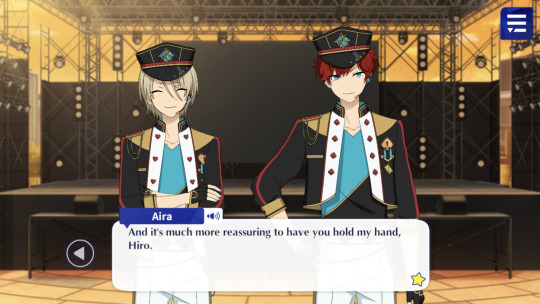
theres also this. which i think about regularly. the hiiai shipping fuel is vast
and additionally i think aira has some really great relationships with other characters too, alkaloid especially. feather touch develops his relationship with tatsumi a lot and its one of my favorite aira moments. i couldnt find my screenshots for this one but basically aira gives tatsumi his unlocked phone (something VERY important to aira since hes a little screenager) and it shows tatsumi just how much aira trusts him and he realizes how important aira is as a friend to him. being someone with a history like him aira's friendship is sort of new to him and it helps them both grow
he loves his friends so so much and he’s had a positive impact on all of alkaloid. he is its heart after all
but in any case i'm not going to like, defend myself for liking aira. i am aware that the shitty stuff has been there from the start but i've said something similar in the past that was like. aira isn't real and he cannot take accountability for what he says. he's a character written by real people who doesn't have any control over how he acts. so i guess that's why when i think the writers write something i dont think he would do or say in my own personal aira opinion i can sort of brush it off as just bad writing.
and not in the sense that i dont recognize that enstars sucks, because it does. enstars can be terribly racist sometimes and not just when concerning aira, and thats important to talk about (i.e. the orient cards, the king of thieves cards, etc). but at the end of the day the most important thing to recognize is the people and company behind the game as well as the real people who play the game and are affected by it. and not like, the specific characters in the game. cause they didn't actually do anything or feel anything you know
#cryn answers#anon#enstars#media analysis#im a miraculous ladybug fan im used to pretending that the thing i like is better than it actually is lmfao#was including sources for what im saying too much??#anyway i didnt even touch on airas own experiences with racial discrimination#i dont think its written perfectly so thats why i didnt talk about it but its an important aspect of his character too#and an important part in his place in alkaloid#also i hope i dont come off as rude or upset in this anon#i appreciate you being respectful#but also im a little tired of talking about this ill admit it#i enjoyed rambling about aira again im just like :( that its cause of all the discourse and whatever happening right now#blegh#i think its kind of like. i mean if you only hear little tidbits of what a character is like through twitter screenshots#youre not gonna have a full picture#and i think thats how it is for a lot of enstarries with aira#and thats not a jab at anyone i dont know jackshit about like. mama or undead or fine or akatsuki. and thats fine#theres too many characters for me to know everything about everyone#but with aira specifically his only character trait to the people who dont produce alkaloid is 'the racist one'#and that sucks#but anyways. thats all i have in me for now
19 notes
·
View notes
Text
Bloom into You Analysis: Ch. 3
Its finally here! This time, its Bloom into You Chapter 3. This one is going to be a little shorter just because there is not as much to talk about, story progression wise. A lot of this chapter is more dedicated to progressing the student council election arc than it necessarily is progressing Yuu and Nanami’s relationship. Either way, lets get into it. My favorite panel is actually the title card:

I just think its cute! Analysis below the cut:
Yuu and Nanami are now in a brand new post-kiss world. Yet, the kiss isn’t the only thing on their minds. As I said above, a lot of this chapter deals with the student council election. The characters are putting up fliers, taking candidate photos, conducting interviews about their candidacy, etc. And, because Yuu is Nanami’s campaign manager, she is heavily involved in all of this, and is spending a lot of time around Nanami, which gives her a lot of time to reflect on the kiss. But first, Nanami pulls her aside and apologizes for what happened, insisting that she only asked Yuu to be her campaign manager so they could work together as friends. Yuu forgives her, says it is fine, and they move on. It is not until after the apology that Yuu begins to truly reflect on what happened.
And, the truth is, she is frustrated. Her thoughts reveal that that was her first kiss, and she, in her words, “didn’t feel anything” (Ch. 3, pg. 8; emphasis original). While she does not seem surprised by this fact, she is definitely disappointed. But, she cannot get this moment out of her head, her thoughts circling around and around it. This comes to a head when all the candidates and their campaign managers line up together for a photograph. Yuu’s and Nanami’s hands bump together, and Yuu takes this opportunity to conduct a test. She takes Nanami by the hand behind their backs, where the camera can’t see, and she watches Nanami’s reaction. Nanami, of course, gets flustered because she didn’t expect this and she blushes, which seemingly infuriates Yuu. She glares at Nanami behind her back, literally thinking, “It’s not fair” (ch. 3, pg. 18; emphasis original). Her thoughts continue:

This moment, more than any other, the confession, the kiss, or anything else Nanami has done seems to be what confirms for Yuu that they are not the same. Which leads to the next page:

And this is where Yuu’s character arc is introduced into the story, and it is set up wonderfully in this panel through, what is effectively, the “show don’t tell” rule. Any writer or creative who partakes in storytelling has heard this rule. It boils down to this: when you are telling a story, it is, generally, better to show the audience what happens as opposed to telling them what happens. For example, if you were writing a short story and you wanted to convey that a character is scared, you wouldn’t write “Yuu was scared” because that is telling the audience she is feeling. Instead, it is generally better to write, “Yuu clenched her sweat soaked palms and took a small step back.” (This is not the best example, but its gets the point across). This shows the audience that Yuu is afraid through her actions and has the potential to produce a more visceral emotional reaction in said audience. Nakatani is likely well aware of this “rule,” and, since Bloom into You is being told through a visual medium, she is able to utilize a blend of showing and telling to depict Yuu’s complex emotional state. By doing so in this scene, Nakatani is setting up Yuu’s internal conflict, or what her story is really about, by creating a situation in which Yuu’s actions contradict her words. The above panel is an excellent example of this. Look at Yuu’s thoughts on the page. Her inner monologue is claiming that the situation is not fair, is claiming that Yuu doesn’t know know what it is like to have someone special. She thinks that she cannot feel love and therefore cannot love Nanami. Through Yuu’s thoughts in this scene, Nakatani is, in some ways, telling the audience how Yuu feels. But, look what the physical actions Yuu is taking. Nanami starts to walk away, and Yuu steps towards her, holding her hand out. She is reaching for Nanami. It almost looks like she is going to call out to her. But why would she do that unless she already has some feelings for Nanami?
In an updated version of the part two analysis, which is linked in the master link document at the end, I focused on two moments in chapter two, in which Yuu repeatedly insists that Nanami can’t like her because, according to her, ““We’re both girls” (pg. 4 & 26). Yuu clings to these notions, according to my interpretation, because she is trying to protect herself from the fact that she is attracted to Nanami. This scene supports that intrepretation, while also implying that it may already be too late for Yuu; she may already like Nanami. The problem is the way Yuu feels doesn’t match up with the romanticized version of these feelings in the love songs she likes and romance manga she reads. And, because of that, she stops herself from reaching out, giving in to her own beliefs and ultimately cutting herself off from the way she feels, instead isolating herself. In this panel, the night sky in the background symbolizes how far away from Nanami Yuu feels. She’s not even on the ground, and is instead floating up with the stars. This contradiction in character — the Yuu who simultaneously has feelings for Nanami and cannot have feelings for anyone at the same time — is the main internal conflict of this story. It drives Yuu’s actions forward from chapter to chapter, as she learns, slowly, that though love may never be what you expect it to be, it will always find you, because there is plenty of love in the world.
And, now that this contradiction is in place, it can begin to affect the story, which it does at the end of this chapter (lots of images below):





After the election events, Yuu and Nanami go home, and Nanami invites Yuu to a coffee shop (this shop will become important to the narrative later, but for right now its just a coffee shop). Yuu agrees, and they have this exchange. In this scene, Yuu’s actions reveal a lot about her mindset. Nanami asks if she can just stay by Yuu’s side and be in love with her, and Yuu agrees, but she doesn’t know why. Internally, she is calling Nanami unfair and acting as if Nanami is twisting her arm about the situation. But is she? Yuu is being a bit of an unreliable narrator here, and to prove it I want to talk about Can’t Defy the Lonely Girl (blog spoilers: review on this coming in a few weeks).
Can’t defy the Lonely Girl is another girl’s love manga that tells the story of Ayaka and Sora. The general gist is this: Ayaka desperately wants to get into a good college, but she has bad test anxiety. As a result of this, she did not get into her first choice high school. One of her teachers is aware of this, and cuts her a deal: “Sora Honda has not come to class a single this semester; if you can get her to come to class refularly, I will write you a recommendation letter to whatever school you want.” Ayaka agrees, and goes to Sora’s house to talk to her. Sora agrees to come to class on one condition: Ayaka must agree to one “request” everyday. The first request? Sora wants to kiss her. As the story progresses, whenever Ayaka doesn’t want to do something that Sora wants her to do, Sora uses her request to get her to do it (its mostly harmless stuff). During some of these moments, Ayaka internally relents that Sora is being “not fair.” And this brings us back to Bloom into You.
Compare this scene to the description of Can’t Defy the Lonely Girl above. How is Nanami being “unfair” to Yuu here? Yuu can just say no. It is not like Ayaka’s situation, where her and Sora have an agreement that she desperately needs to keep in order to achieve her goals. What is stopping Yuu from walking away? Nothing about Nanami’s mannerisms or speech imply that she would not respect Yuu’s wishes if asked to leave her alone. If Nanami is not the one pressuring her, then who else is left to pressure her but herself? This is not to say that I think Yuu loves Nanami yet; its far too early in the story for that. But, I definitely think her feelings extend beyond just platonic friendship. The question only remains: How does their relationship develop from here?
Not that these are back, I’m only going to do them twice a week, but there won't be a set upload schedule. This is probably not a good idea for blog growth, but with my current schedule, it will be better for me if I stay flexible. Please look forward to chapter four later this week. Also, if you missed chapters 1 and 2, here is the masterlist with all the links: https://hero.page/theyurilibrarian/personal. Each time a new analysis goes up, the previous analysis will be added to this list, and it will always be attached at the end.
Thanks for reading! Here’s the bonus panel for this chapter:

#bloom into you#biy analysis#analysis#yuri#yuri posting#girls love#manga#didn't have time to let my partner edit this one#so if its not as clean sorry#truth is i owe her credit for like 50% for all success my writing has cause she edits basically everything i do#hope you enjoyed anyway!
11 notes
·
View notes
Note
hii love! since u are so open and kind to answer any questions regarded to tibyim, i have one! feels like it was kinda obvious, but what was meant to be said in this part?
On your lengthy trek back to Hob’s flat, he asks, “Have you ever…?”
A gnawing pain ricochets through your chest. “Yeah.”
Hob appears crushed at your strangled admission, his voice gentle and kind, “Okay.”
hope this ask will reach u, since i bet u get quite a lot of them!! thank u so much and good good luck and lots of adoration<3
Pretty sure at least 1/4 of the messages I've gotten since part 9 dropped have all been about this moment.
And all I will say about it is: it's purposeful. Purposeful in its fragmented shortness. Purposeful in the very potent heaviness emitting from essentially three lines in over 8k chapter. I know what I intended to say with it (and I think certain people reading it will be able to as well, just based on emotions portrayed here alone), but I like to leave it up to reader interpretation.
In a similar manner, I have never outlined (or plan outline) the exacts of why Wanderer was cursed. You will get more information on the curse, and the individuals involved, but the exact details I like to leave up to you. That's mainly because I love the idea of each reader coming up with their own explanations, meaning that each version of Wanderer is just slightly different and unique. Very fitting to the actual character and the lore surrounding them.
#you know how everyone tells a story slightly differently? focusing on different aspects more or using different words etc#that energy#but also yeah. if you scrutinise that exchange a lil more and think about wanderer's life..... yeah.#hope you don't mind the half answer but in all honestly I don't enjoy telling you beat for beat every detail#i think storytelling is personal and i love seeing people taking away different things from the text <3#making that room for personal interpretation.#you guys are also smart af and I don't enjoy treating readers like they can't put two and two together#because you do that and then give me analysis so through I'm just vibrating in my seat from delight because !!!!!!!!!#asks#fic: today i bury you in me
125 notes
·
View notes
Text
can discourse just stop happening on my dash forever thanks 👍
#so sick and tired I’m here for fanart and fics and occasionally character analysis#stop reblogging politics and talking about bad parts of fandom getting mad at people having opinions#Ultimately does that all really matter? is it going to be important in years to come? are u gonna look back & remember this in the future?#are you really gonna be like yeah wow I really hope x creator or x fandom knows how wrong they are when you’re using a walker?#it time to learn to talk about this stuff with your small trusted friend groups. quit going online and posting this for everyone to see#can we just enjoy ourselves on the internet… peace love and hugs forever…#savvieposts
3 notes
·
View notes